
The Project Gutenberg EBook of A Tramp Abroad, by Mark Twain (Samuel Clemens)
This eBook is for the use of anyone anywhere at no cost and with
almost no restrictions whatsoever. You may copy it, give it away or
re-use it under the terms of the Project Gutenberg License included
with this eBook or online at www.gutenberg.org
Title: A Tramp Abroad
Part 5
Author: Mark Twain (Samuel Clemens)
Release Date: June 2004 [EBook #5786]
Posting Date: June 2, 2009
Language: English
Character set encoding: ISO-8859-1
*** START OF THIS PROJECT GUTENBERG EBOOK A TRAMP ABROAD ***
Produced by Anonymous Volunteers, John Greenman and David Widger
| Previous Part | Next Part |



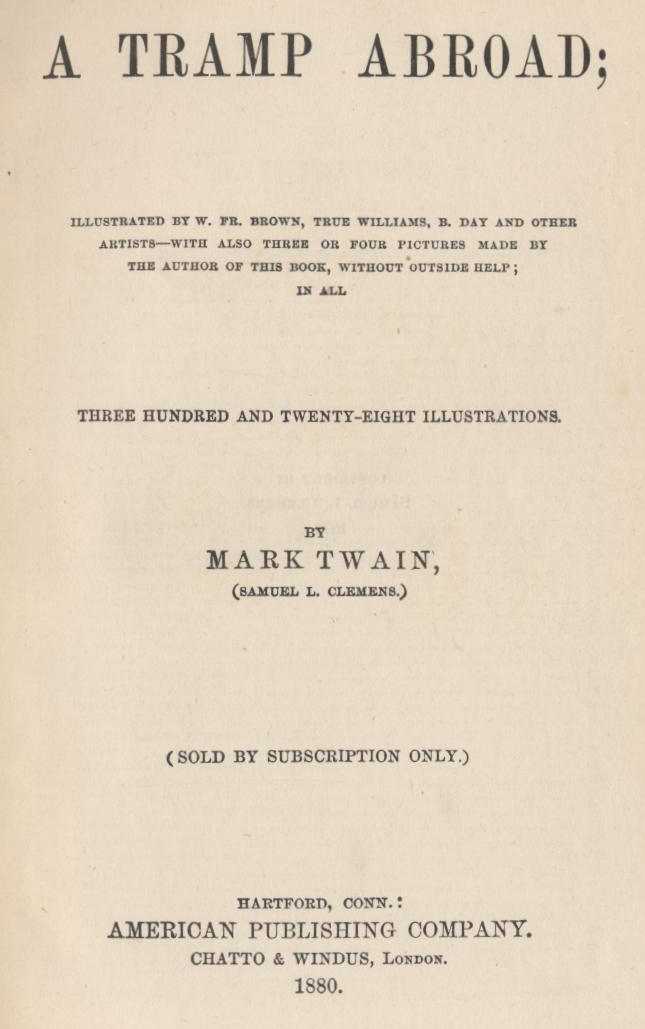
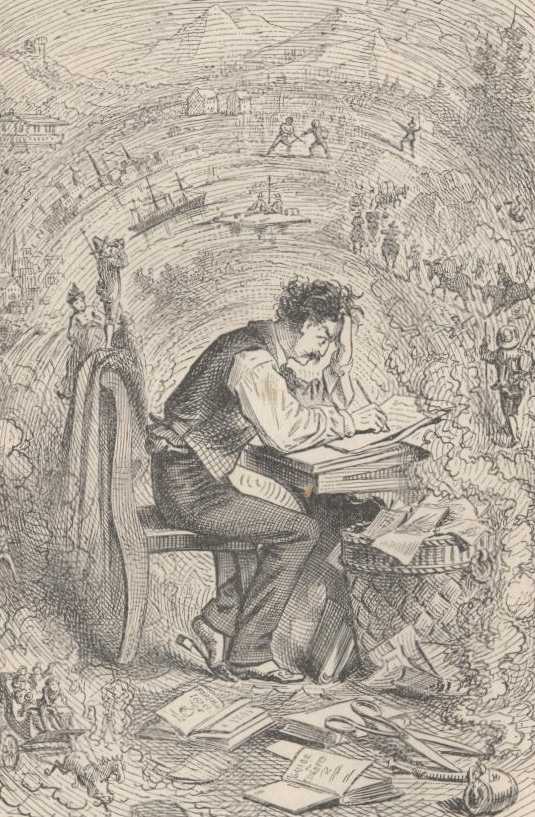
CHAPTER XXIX
Everything Convenient—Looking for a Western Sunrise—Mutual Recrimination—View from the Summit—Down the Mountain—Railroading—Confidence Wanted and Acquired
CHAPTER XXX
A Trip by Proxy—A Visit to the Furka Regions—Deadman's Lake—Source of the Rhone—Glacier Tables—Storm in the Mountains—At Grindelwald—Dawn on the Mountains—An Explanation Required—Dead Language—Criticism of Harris's Report
CHAPTER XXXI
Preparations for a Tramp—From Lucerne to Interlaken—The Brunig Pass—Modern and Ancient Chalets—Death of Pontius Pilate—Hermit Home of St Nicholas—Landslides—Children Selling Refreshments—How they Harness a Horse—A Great Man—Honors to a Hero—A Thirsty Bride—For Better or Worse—German Fashions—Anticipations—Solid Comfort—An Unsatisfactory \ Awakening—What we had Lost—Our Surroundings
CHAPTER XXXII
The Jungfrau Hotel—A Whiskered Waitress—An Arkansas Bride—Perfection in Discord—A Famous Victory—A Look from a Window—About the Jungfrau
CHAPTER XXXIII
The Giesbach Falls—The Spirit of the Alps—Why People Visit Them—Whey and Grapes as Medicines—The Kursaal—A Formidable Undertaking—From Interlaken to Zermatt on Foot—We Concluded to take a Buggy—A Pair of Jolly Drivers—We meet with Companions—A Cheerful Ride—Kandersteg Valley—An Alpine Parlor—Exercise and Amusement—A Race with a Log
CHAPTER XXXIV
An Old Guide—Possible Accidents—Dangerous Habitation—Mountain Flowers—Embryo Lions—Mountain Pigs—The End of The World—Ghastly Desolation—Proposed Adventure—Reading-up Adventures—Ascent of Monte Rosa—Precipices and Crevasses—Among the Snows—Exciting Experiences—lee Ridges—The Summit—Adventures Postponed
CHAPTER XXXV
A New Interest—Magnificent Views—A Mule's Prefereoces—Turning Mountain Corners—Terror of a Horse—Lady Tourists—Death of a young Countess—A Search for a Hat—What We Did Find—Harris's Opinion of Chamois—A Disappointed Man—A Giantess—Model for an Empress—Baths at Leuk—Sport in the Water—The Gemmi Precipices—A Palace for an Emperor—The Famous Ladders—Considerably Mixed Up—Sad Plight of a Minister
He kept his word. We heard his horn and instantly got up. It was dark and cold and wretched. As I fumbled around for the matches, knocking things down with my quaking hands, I wished the sun would rise in the middle of the day, when it was warm and bright and cheerful, and one wasn't sleepy. We proceeded to dress by the gloom of a couple sickly candles, but we could hardly button anything, our hands shook so. I thought of how many happy people there were in Europe, Asia, and America, and everywhere, who were sleeping peacefully in their beds, and did not have to get up and see the Rigi sunrise—people who did not appreciate their advantage, as like as not, but would get up in the morning wanting more boons of Providence. While thinking these thoughts I yawned, in a rather ample way, and my upper teeth got hitched on a nail over the door, and while I was mounting a chair to free myself, Harris drew the window-curtain, and said:
"Oh, this is luck! We shan't have to go out at
all—yonder are the mountains, in full view."
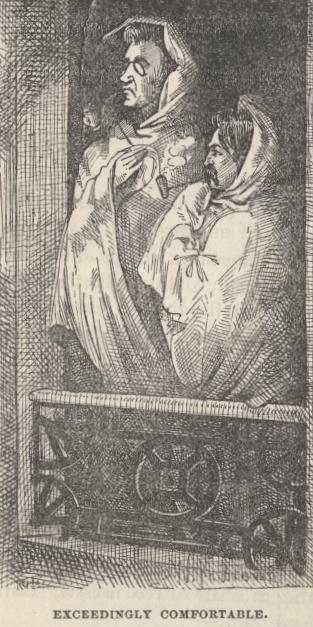
That was glad news, indeed. It made us cheerful right away. One could see the grand Alpine masses dimly outlined against the black firmament, and one or two faint stars blinking through rifts in the night. Fully clothed, and wrapped in blankets, and huddled ourselves up, by the window, with lighted pipes, and fell into chat, while we waited in exceeding comfort to see how an Alpine sunrise was going to look by candlelight. By and by a delicate, spiritual sort of effulgence spread itself by imperceptible degrees over the loftiest altitudes of the snowy wastes—but there the effort seemed to stop. I said, presently:
"There is a hitch about this sunrise somewhere. It doesn't seem to go. What do you reckon is the matter with it?"
"I don't know. It appears to hang fire somewhere. I never saw a sunrise act like that before. Can it be that the hotel is playing anything on us?"
"Of course not. The hotel merely has a property interest in the sun, it has nothing to do with the management of it. It is a precarious kind of property, too; a succession of total eclipses would probably ruin this tavern. Now what can be the matter with this sunrise?"
Harris jumped up and said:
"I've got it! I know what's the matter with it! We've been looking at the place where the sun SET last night!"
"It is perfectly true! Why couldn't you have thought of that sooner? Now we've lost another one! And all through your blundering. It was exactly like you to light a pipe and sit down to wait for the sun to rise in the west."
"It was exactly like me to find out the mistake, too. You never would have found it out. I find out all the mistakes."
"You make them all, too, else your most valuable faculty would be wasted on you. But don't stop to quarrel, now—maybe we are not too late yet."
But we were. The sun was well up when we got to the
exhibition-ground.
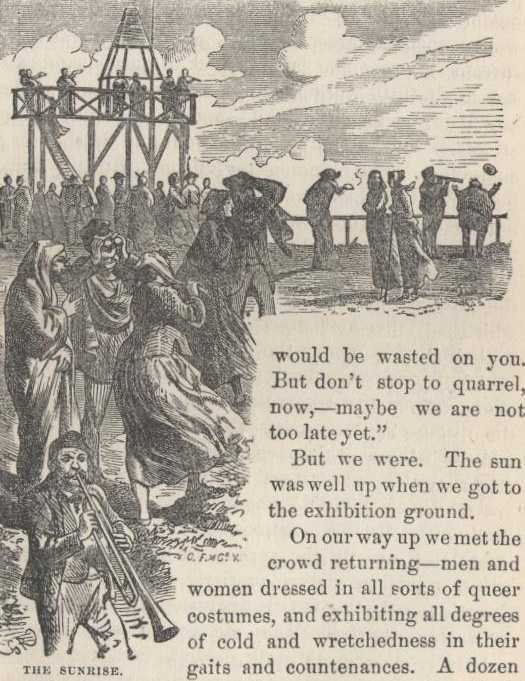
On our way up we met the crowd returning—men and women dressed in all sorts of queer costumes, and exhibiting all degrees of cold and wretchedness in their gaits and countenances. A dozen still remained on the ground when we reached there, huddled together about the scaffold with their backs to the bitter wind. They had their red guide-books open at the diagram of the view, and were painfully picking out the several mountains and trying to impress their names and positions on their memories. It was one of the saddest sights I ever saw.
Two sides of this place were guarded by railings,
to keep people from being blown over the precipices.
The view, looking sheer down into the broad valley,
eastward, from this great elevation—almost a perpendicular
mile—was very quaint and curious. Counties, towns,
hilly ribs and ridges, wide stretches of green meadow,
great forest tracts, winding streams, a dozen blue lakes,
a block of busy steamboats—we saw all this little
world in unique circumstantiality of detail—saw it
just as the birds see it—and all reduced to the smallest
of scales and as sharply worked out and finished as a
steel engraving. The numerous toy villages, with tiny
spires projecting out of them, were just as the children
might have left them when done with play the day before;
the forest tracts were diminished to cushions of moss;
one or two big lakes were dwarfed to ponds, the smaller
ones to puddles—though they did not look like puddles,
but like blue teardrops which had fallen and lodged
in slight depressions, conformable to their shapes,
among the moss-beds and the smooth levels of dainty
green farm-land; the microscopic steamboats glided along,
as in a city reservoir, taking a mighty time to cover
the distance between ports which seemed only a yard apart;
and the isthmus which separated two lakes looked as if
one might stretch out on it and lie with both elbows
in the water, yet we knew invisible wagons were toiling
across it and finding the distance a tedious one.
This beautiful miniature world had exactly the appearance
of those "relief maps" which reproduce nature precisely,
with the heights and depressions and other details graduated
to a reduced scale, and with the rocks, trees, lakes,
etc., colored after nature.
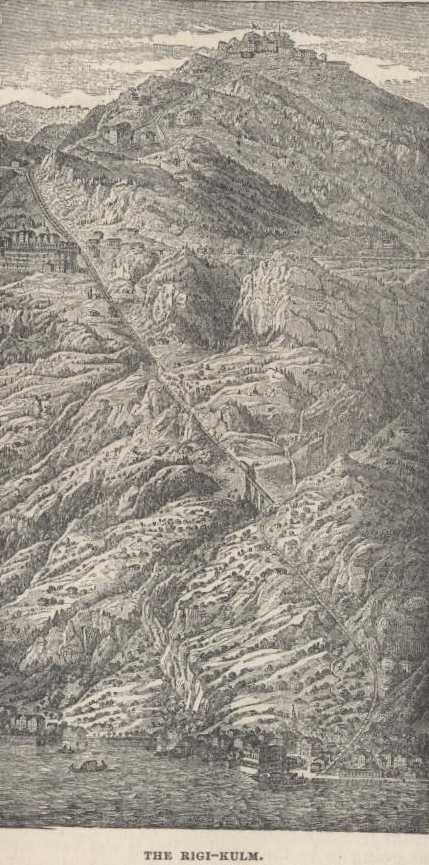
I believed we could walk down to Waeggis or Vitznau in a day, but I knew we could go down by rail in about an hour, so I chose the latter method. I wanted to see what it was like, anyway. The train came along about the middle of the afternoon, and an odd thing it was. The locomotive-boiler stood on end, and it and the whole locomotive were tilted sharply backward. There were two passenger-cars, roofed, but wide open all around. These cars were not tilted back, but the seats were; this enables the passenger to sit level while going down a steep incline.
There are three railway-tracks; the central one is cogged; the "lantern wheel" of the engine grips its way along these cogs, and pulls the train up the hill or retards its motion on the down trip. About the same speed—three miles an hour—is maintained both ways. Whether going up or down, the locomotive is always at the lower end of the train. It pushes in the one case, braces back in the other. The passenger rides backward going up, and faces forward going down.
We got front seats, and while the train moved along about fifty yards on level ground, I was not the least frightened; but now it started abruptly downstairs, and I caught my breath. And I, like my neighbors, unconsciously held back all I could, and threw my weight to the rear, but, of course, that did no particular good. I had slidden down the balusters when I was a boy, and thought nothing of it, but to slide down the balusters in a railway-train is a thing to make one's flesh creep. Sometimes we had as much as ten yards of almost level ground, and this gave us a few full breaths in comfort; but straightway we would turn a corner and see a long steep line of rails stretching down below us, and the comfort was at an end. One expected to see the locomotive pause, or slack up a little, and approach this plunge cautiously, but it did nothing of the kind; it went calmly on, and went it reached the jumping-off place it made a sudden bow, and went gliding smoothly downstairs, untroubled by the circumstances.
It was wildly exhilarating to slide along the edge of the precipices, after this grisly fashion, and look straight down upon that far-off valley which I was describing a while ago.
There was no level ground at the Kaltbad station; the railbed was as steep as a roof; I was curious to see how the stop was going to be managed. But it was very simple; the train came sliding down, and when it reached the right spot it just stopped—that was all there was "to it"—stopped on the steep incline, and when the exchange of passengers and baggage had been made, it moved off and went sliding down again. The train can be stopped anywhere, at a moment's notice.
There was one curious effect, which I need not take the
trouble to describe—because I can scissor a description
of it out of the railway company's advertising pamphlet,
and save my ink:
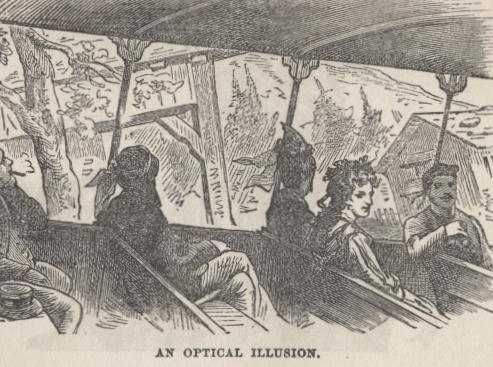
"On the whole tour, particularly at the Descent, we undergo an optical illusion which often seems to be incredible. All the shrubs, fir trees, stables, houses, etc., seem to be bent in a slanting direction, as by an immense pressure of air. They are all standing awry, so much awry that the chalets and cottages of the peasants seem to be tumbling down. It is the consequence of the steep inclination of the line. Those who are seated in the carriage do not observe that they are going down a declivity of twenty to twenty-five degrees (their seats being adapted to this course of proceeding and being bent down at their backs). They mistake their carriage and its horizontal lines for a proper measure of the normal plain, and therefore all the objects outside which really are in a horizontal position must show a disproportion of twenty to twenty-five degrees declivity, in regard to the mountain."
By the time one reaches Kaltbad, he has acquired confidence in the railway, and he now ceases to try to ease the locomotive by holding back. Thenceforth he smokes his pipe in serenity, and gazes out upon the magnificent picture below and about him with unfettered enjoyment. There is nothing to interrupt the view or the breeze; it is like inspecting the world on the wing. However—to be exact—there is one place where the serenity lapses for a while; this is while one is crossing the Schnurrtobel Bridge, a frail structure which swings its gossamer frame down through the dizzy air, over a gorge, like a vagrant spider-strand.
One has no difficulty in remembering his sins while the train is creeping down this bridge; and he repents of them, too; though he sees, when he gets to Vitznau, that he need not have done it, the bridge was perfectly safe.
So ends the eventual trip which we made to the Rigi-Kulm
to see an Alpine sunrise.
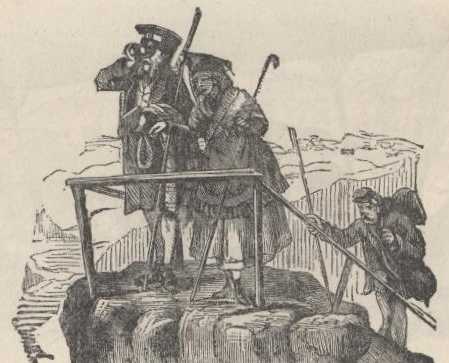
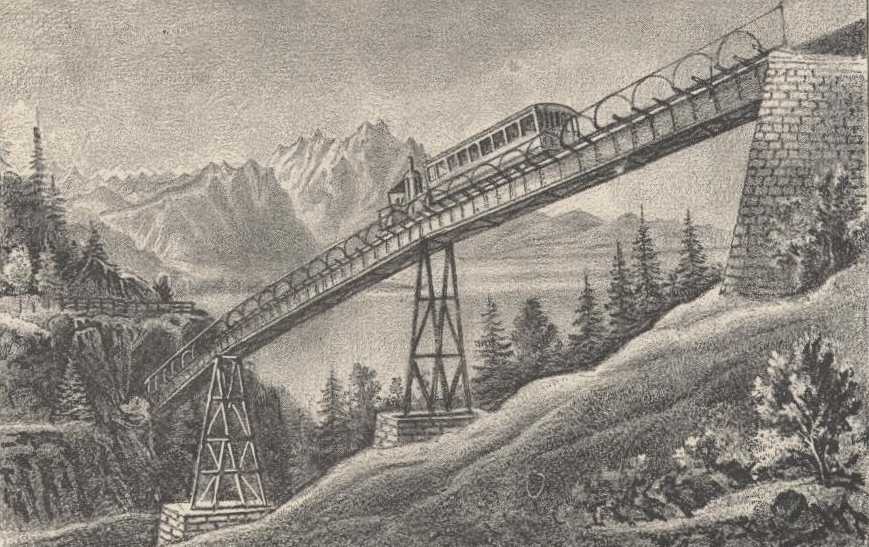
An hour's sail brought us to Lucerne again. I judged it best to go to bed and rest several days, for I knew that the man who undertakes to make the tour of Europe on foot must take care of himself.
Thinking over my plans, as mapped out, I perceived that they did not take in the Furka Pass, the Rhone Glacier, the Finsteraarhorn, the Wetterhorn, etc. I immediately examined the guide-book to see if these were important, and found they were; in fact, a pedestrian tour of Europe could not be complete without them. Of course that decided me at once to see them, for I never allow myself to do things by halves, or in a slurring, slipshod way.
I called in my agent and instructed him to go without delay and make a careful examination of these noted places, on foot, and bring me back a written report of the result, for insertion in my book. I instructed him to go to Hospenthal as quickly as possible, and make his grand start from there; to extend his foot expedition as far as the Giesbach fall, and return to me from thence by diligence or mule. I told him to take the courier with him.
He objected to the courier, and with some show of reason, since he was about to venture upon new and untried ground; but I thought he might as well learn how to take care of the courier now as later, therefore I enforced my point. I said that the trouble, delay, and inconvenience of traveling with a courier were balanced by the deep respect which a courier's presence commands, and I must insist that as much style be thrown into my journeys as possible.
So the two assumed complete mountaineering costumes and departed. A week later they returned, pretty well used up, and my agent handed me the following:
Official Report
OF A VISIT TO THE FURKA REGION.
BY H. HARRIS, AGENT
About seven o'clock in the morning, with perfectly
fine weather, we started from Hospenthal, and arrived at
the MAISON on the Furka in a little under QUATRE hours.
The want of variety in the scenery from Hospenthal made
the KAHKAHPONEEKA wearisome; but let none be discouraged;
no one can fail to be completely R'ECOMPENS'EE for
his fatigue, when he sees, for the first time, the monarch
of the Oberland, the tremendous Finsteraarhorn. A moment
before all was dullness, but a PAS further has placed us
on the summit of the Furka; and exactly in front of us,
at a HOPOW of only fifteen miles, this magnificent mountain
lifts its snow-wreathed precipices into the deep blue sky.
The inferior mountains on each side of the pass form
a sort of frame for the picture of their dread lord,
and close in the view so completely that no other prominent
feature in the Oberland is visible from this BONG-A-BONG;
nothing withdraws the attention from the solitary grandeur
of the Finsteraarhorn and the dependent spurs which form
the abutments of the central peak.
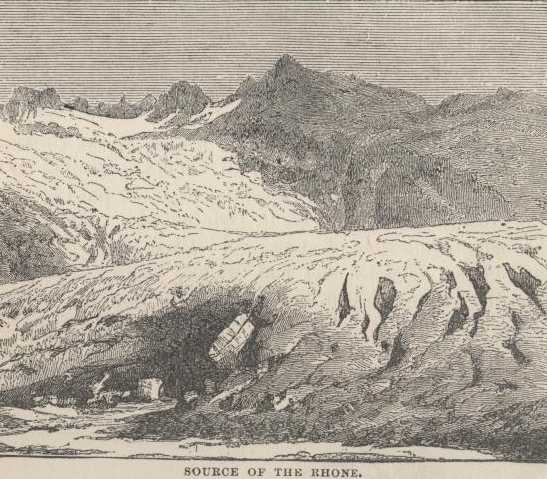
With the addition of some others, who were also bound
for the Grimsel, we formed a large XHVLOJ as we descended
the STEG which winds round the shoulder of a mountain
toward the Rhone Glacier. We soon left the path and took
to the ice; and after wandering amongst the crevices UN PEU,
to admire the wonders of these deep blue caverns, and hear
the rushing of waters through their subglacial channels,
we struck out a course toward L'AUTRE CÔTE and crossed
the glacier successfully, a little above the cave from
which the infant Rhone takes its first bound from under
the grand precipice of ice. Half a mile below this
we began to climb the flowery side of the Meienwand.
One of our party started before the rest, but the HITZE
was so great, that we found IHM quite exhausted,
and lying at full length in the shade of a large GESTEIN.
We sat down with him for a time, for all felt the heat
exceedingly in the climb up this very steep BOLWOGGOLY,
and then we set out again together, and arrived at last
near the Dead Man's Lake, at the foot of the Sidelhorn.
This lonely spot, once used for an extempore burying-place,
after a sanguinary BATTUE between the French and Austrians,
is the perfection of desolation; there is nothing in sight
to mark the hand of man, except the line of weather-beaten
whitened posts, set up to indicate the direction of the pass
in the OWDAWAKK of winter. Near this point the footpath joins
the wider track, which connects the Grimsel with the head
of the Rhone SCHNAWP; this has been carefully constructed,
and leads with a tortuous course among and over LES PIERRES,
down to the bank of the gloomy little SWOSH-SWOSH, which
almost washes against the walls of the Grimsel Hospice.
We arrived a little before four o'clock at the end
of our day's journey, hot enough to justify the step,
taking by most of the PARTIE, of plunging into the crystal
water of the snow-fed lake.
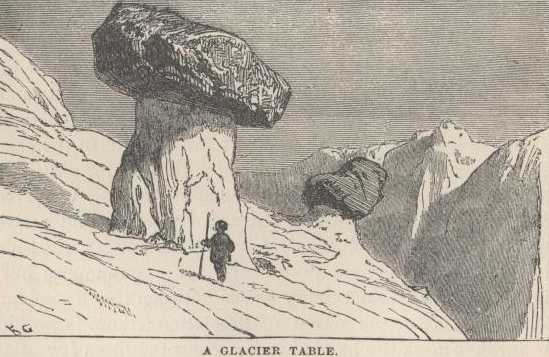
The next afternoon we started for a walk up the Unteraar glacier, with the intention of, at all events, getting as far as the Hütte which is used as a sleeping-place by most of those who cross the Strahleck Pass to Grindelwald. We got over the tedious collection of stones and DÉBRIS which covers the PIED of the GLETCHER, and had walked nearly three hours from the Grimsel, when, just as we were thinking of crossing over to the right, to climb the cliffs at the foot of the hut, the clouds, which had for some time assumed a threatening appearance, suddenly dropped, and a huge mass of them, driving toward us from the Finsteraarhorn, poured down a deluge of HABOOLONG and hail. Fortunately, we were not far from a very large glacier-table; it was a huge rock balanced on a pedestal of ice high enough to admit of our all creeping under it for GOWKARAK. A stream of PUCKITTYPUKK had furrowed a course for itself in the ice at its base, and we were obliged to stand with one FUSS on each side of this, and endeavor to keep ourselves CHAUD by cutting steps in the steep bank of the pedestal, so as to get a higher place for standing on, as the WASSER rose rapidly in its trench. A very cold BZZZZZZZZEEE accompanied the storm, and made our position far from pleasant; and presently came a flash of BLITZEN, apparently in the middle of our little party, with an instantaneous clap of YOKKY, sounding like a large gun fired close to our ears; the effect was startling; but in a few seconds our attention was fixed by the roaring echoes of the thunder against the tremendous mountains which completely surrounded us. This was followed by many more bursts, none of WELCHE, however, was so dangerously near; and after waiting a long DEMI-hour in our icy prison, we sallied out to talk through a HABOOLONG which, though not so heavy as before, was quite enough to give us a thorough soaking before our arrival at the Hospice.
The Grimsel is CERTAINEMENT a wonderful place; situated at the bottom of a sort of huge crater, the sides of which are utterly savage GEBIRGE, composed of barren rocks which cannot even support a single pine ARBRE, and afford only scanty food for a herd of GMWKWLLOLP, it looks as if it must be completely BEGRABEN in the winter snows. Enormous avalanches fall against it every spring, sometimes covering everything to the depth of thirty or forty feet; and, in spite of walls four feet thick, and furnished with outside shutters, the two men who stay here when the VOYAGEURS are snugly quartered in their distant homes can tell you that the snow sometimes shakes the house to its foundations.
Next morning the HOGGLEBUMGULLUP still continued bad, but we made up our minds to go on, and make the best of it. Half an hour after we started, the REGEN thickened unpleasantly, and we attempted to get shelter under a projecting rock, but being far to NASS already to make standing at all AGRÉABLE, we pushed on for the Handeck, consoling ourselves with the reflection that from the furious rushing of the river Aar at our side, we should at all events see the celebrated WASSERFALL in GRANDE PERFECTION. Nor were we NAPPERSOCKET in our expectation; the water was roaring down its leap of two hundred and fifty feet in a most magnificent frenzy, while the trees which cling to its rocky sides swayed to and fro in the violence of the hurricane which it brought down with it; even the stream, which falls into the main cascade at right angles, and TOUTEFOIS forms a beautiful feature in the scene, was now swollen into a raging torrent; and the violence of this "meeting of the waters," about fifty feet below the frail bridge where we stood, was fearfully grand. While we were looking at it, GLÜECKLICHEWEISE a gleam of sunshine came out, and instantly a beautiful rainbow was formed by the spray, and hung in mid-air suspended over the awful gorge.
On going into the CHALET above the fall, we were
informed that a BRUECKE had broken down near Guttanen,
and that it would be impossible to proceed for some time;
accordingly we were kept in our drenched condition for
EIN STUNDE, when some VOYAGEURS arrived from Meiringen,
and told us that there had been a trifling accident,
ABER that we could now cross. On arriving at the spot,
I was much inclined to suspect that the whole story was a ruse
to make us SLOWWK and drink the more at the Handeck Inn,
for only a few planks had been carried away, and though
there might perhaps have been some difficulty with mules,
the gap was certainly not larger than a MMBGLX might cross
with a very slight leap. Near Guttanen the HABOOLONG
happily ceased, and we had time to walk ourselves tolerably
dry before arriving at Reichenback, WO we enjoyed a good DINÉ
at the Hotel des Alps.
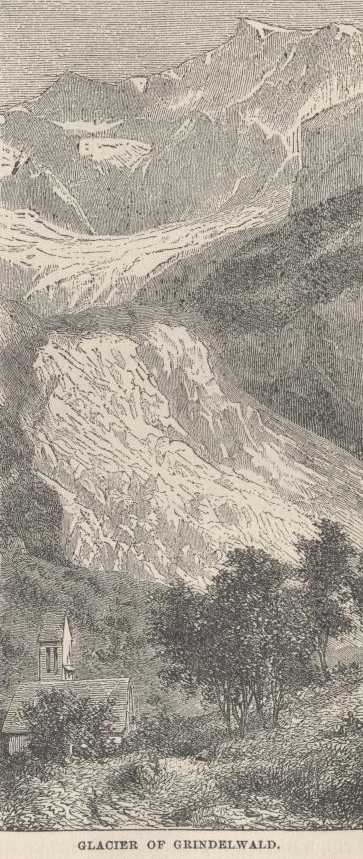
Next morning we walked to Rosenlaui, the BEAU IDÉAL of Swiss scenery, where we spent the middle of the day in an excursion to the glacier. This was more beautiful than words can describe, for in the constant progress of the ice it has changed the form of its extremity and formed a vast cavern, as blue as the sky above, and rippled like a frozen ocean. A few steps cut in the WHOOPJAMBOREEHOO enabled us to walk completely under this, and feast our eyes upon one of the loveliest objects in creation. The glacier was all around divided by numberless fissures of the same exquisite color, and the finest wood-ERDBEEREN were growing in abundance but a few yards from the ice. The inn stands in a CHARMANT spot close to the CÔTÉ DE LA RIVIÈRE, which, lower down, forms the Reichenbach fall, and embosomed in the richest of pine woods, while the fine form of the Wellhorn looking down upon it completes the enchanting BOPPLE. In the afternoon we walked over the Great Scheideck to Grindelwald, stopping to pay a visit to the Upper glacier by the way; but we were again overtaken by bad HOGGLEBUMGULLUP and arrived at the hotel in a SOLCHE a state that the landlord's wardrobe was in great request.
The clouds by this time seemed to have done their worst, for a lovely day succeeded, which we determined to devote to an ascent of the Faulhorn. We left Grindelwald just as a thunder-storm was dying away, and we hoped to find GUTEN WETTER up above; but the rain, which had nearly ceased, began again, and we were struck by the rapidly increasing FROID as we ascended. Two-thirds of the way up were completed when the rain was exchanged for GNILLIC, with which the BODEN was thickly covered, and before we arrived at the top the GNILLIC and mist became so thick that we could not see one another at more than twenty POOPOO distance, and it became difficult to pick our way over the rough and thickly covered ground. Shivering with cold, we turned into bed with a double allowance of clothes, and slept comfortably while the wind howled AUTOUR DE LA MAISON; when I awoke, the wall and the window looked equally dark, but in another hour I found I could just see the form of the latter; so I jumped out of bed, and forced it open, though with great difficulty from the frost and the quantities of GNILLIC heaped up against it.
A row of huge icicles hung down from the edge of the roof,
and anything more wintry than the whole ANBLICK could
not well be imagined; but the sudden appearance of the
great mountains in front was so startling that I felt no
inclination to move toward bed again. The snow which had
collected upon LA FÊNTRE had increased the FINSTERNISS
ODER DER DUNKELHEIT, so that when I looked out I was
surprised to find that the daylight was considerable,
and that the BALRAGOOMAH would evidently rise before long.
Only the brightest of LES E'TOILES were still shining;
the sky was cloudless overhead, though small curling
mists lay thousands of feet below us in the valleys,
wreathed around the feet of the mountains, and adding
to the splendor of their lofty summits. We were soon
dressed and out of the house, watching the gradual approach
of dawn, thoroughly absorbed in the first near view
of the Oberland giants, which broke upon us unexpectedly
after the intense obscurity of the evening before.
"KABAUGWAKKO SONGWASHEE KUM WETTERHORN SNAWPO!" cried some one,
as that grand summit gleamed with the first rose of dawn;
and in a few moments the double crest of the Schreckhorn
followed its example; peak after peak seemed warmed
with life, the Jungfrau blushed even more beautifully
than her neighbors, and soon, from the Wetterhorn in the
east to the Wildstrubel in the west, a long row of fires
glowed upon mighty altars, truly worthy of the gods.
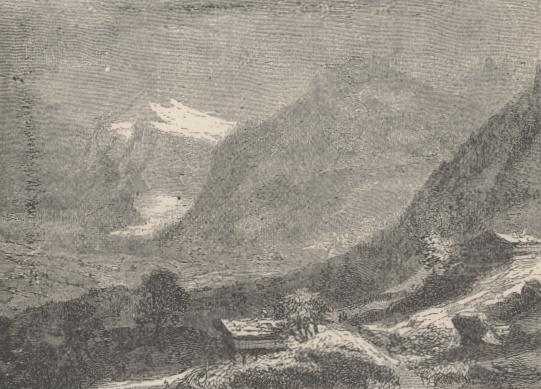
The WLGW was very severe; our sleeping-place could hardly be DISTINGUEÉ from the snow around it, which had fallen to a depth of a FLIRK during the past evening, and we heartily enjoyed a rough scramble EN BAS to the Giesbach falls, where we soon found a warm climate. At noon the day before Grindelwald the thermometer could not have stood at less than 100 degrees Fahr. in the sun; and in the evening, judging from the icicles formed, and the state of the windows, there must have been at least twelve DINGBLATTER of frost, thus giving a change of 80 degrees during a few hours.
I said:
"You have done well, Harris; this report is concise, compact, well expressed; the language is crisp, the descriptions are vivid and not needlessly elaborated; your report goes straight to the point, attends strictly to business, and doesn't fool around. It is in many ways an excellent document. But it has a fault—it is too learned, it is much too learned. What is 'DINGBLATTER'?
"'DINGBLATTER' is a Fiji word meaning 'degrees.'"
"You knew the English of it, then?"
"Oh, yes."
"What is 'GNILLIC'?
"That is the Eskimo term for 'snow.'"
"So you knew the English for that, too?"
"Why, certainly."
"What does 'MMBGLX' stand for?"
"That is Zulu for 'pedestrian.'"
"'While the form of the Wellhorn looking down upon it completes the enchanting BOPPLE.' What is 'BOPPLE'?"
"'Picture.' It's Choctaw."
"What is 'SCHNAWP'?"
"'Valley.' That is Choctaw, also."
"What is 'BOLWOGGOLY'?"
"That is Chinese for 'hill.'"
"'KAHKAHPONEEKA'?"
"'Ascent.' Choctaw."
"'But we were again overtaken by bad HOGGLEBUMGULLUP.' What does 'HOGGLEBUMGULLUP' mean?"
"That is Chinese for 'weather.'"
"Is 'HOGGLEBUMGULLUP' better than the English word? Is it any more descriptive?"
"No, it means just the same."
"And 'DINGBLATTER' and 'GNILLIC,' and 'BOPPLE,' and 'SCHNAWP'—are they better than the English words?"
"No, they mean just what the English ones do."
"Then why do you use them? Why have you used all this Chinese and Choctaw and Zulu rubbish?"
"Because I didn't know any French but two or three words, and I didn't know any Latin or Greek at all."
"That is nothing. Why should you want to use foreign words, anyhow?"
"They adorn my page. They all do it."
"Who is 'all'?"
"Everybody. Everybody that writes elegantly. Anybody has a right to that wants to."
"I think you are mistaken." I then proceeded in the following scathing manner. "When really learned men write books for other learned men to read, they are justified in using as many learned words as they please—their audience will understand them; but a man who writes a book for the general public to read is not justified in disfiguring his pages with untranslated foreign expressions. It is an insolence toward the majority of the purchasers, for it is a very frank and impudent way of saying, 'Get the translations made yourself if you want them, this book is not written for the ignorant classes.' There are men who know a foreign language so well and have used it so long in their daily life that they seem to discharge whole volleys of it into their English writings unconsciously, and so they omit to translate, as much as half the time. That is a great cruelty to nine out of ten of the man's readers. What is the excuse for this? The writer would say he only uses the foreign language where the delicacy of his point cannot be conveyed in English. Very well, then he writes his best things for the tenth man, and he ought to warn the nine other not to buy his book. However, the excuse he offers is at least an excuse; but there is another set of men who are like YOU; they know a WORD here and there, of a foreign language, or a few beggarly little three-word phrases, filched from the back of the Dictionary, and these are continually peppering into their literature, with a pretense of knowing that language—what excuse can they offer? The foreign words and phrases which they use have their exact equivalents in a nobler language—English; yet they think they 'adorn their page' when they say STRASSE for street, and BAHNHOF for railway-station, and so on—flaunting these fluttering rags of poverty in the reader's face and imagining he will be ass enough to take them for the sign of untold riches held in reserve. I will let your 'learning' remain in your report; you have as much right, I suppose, to 'adorn your page' with Zulu and Chinese and Choctaw rubbish as others of your sort have to adorn theirs with insolent odds and ends smouched from half a dozen learned tongues whose A-B ABS they don't even know."
When the musing spider steps upon the red-hot shovel,
he first exhibits a wild surprise, then he shrivels up.
Similar was the effect of these blistering words upon the
tranquil and unsuspecting Agent. I can be dreadfully rough
on a person when the mood takes me.
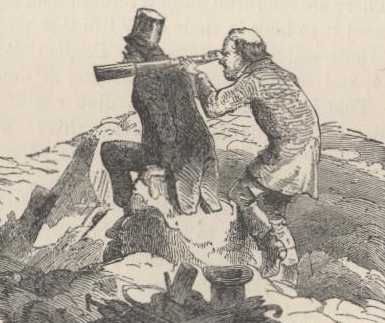
We now prepared for a considerable walk—from Lucerne to Interlaken, over the Bruenig Pass. But at the last moment the weather was so good that I changed my mind and hired a four-horse carriage. It was a huge vehicle, roomy, as easy in its motion as a palanquin, and exceedingly comfortable.
We got away pretty early in the morning, after a hot breakfast, and went bowling over a hard, smooth road, through the summer loveliness of Switzerland, with near and distant lakes and mountains before and about us for the entertainment of the eye, and the music of multitudinous birds to charm the ear. Sometimes there was only the width of the road between the imposing precipices on the right and the clear cool water on the left with its shoals of uncatchable fish skimming about through the bars of sun and shadow; and sometimes, in place of the precipices, the grassy land stretched away, in an apparently endless upward slant, and was dotted everywhere with snug little chalets, the peculiarly captivating cottage of Switzerland.
The ordinary chalet turns a broad, honest gable end to the road, and its ample roof hovers over the home in a protecting, caressing way, projecting its sheltering eaves far outward. The quaint windows are filled with little panes, and garnished with white muslin curtains, and brightened with boxes of blooming flowers. Across the front of the house, and up the spreading eaves and along the fanciful railings of the shallow porch, are elaborate carvings—wreaths, fruits, arabesques, verses from Scripture, names, dates, etc. The building is wholly of wood, reddish brown in tint, a very pleasing color. It generally has vines climbing over it. Set such a house against the fresh green of the hillside, and it looks ever so cozy and inviting and picturesque, and is a decidedly graceful addition to the landscape.
One does not find out what a hold the chalet has taken
upon him, until he presently comes upon a new
house—a house which is aping the town fashions of Germany
and France, a prim, hideous, straight-up-and-down thing,
plastered all over on the outside to look like stone,
and altogether so stiff, and formal, and ugly, and forbidding,
and so out of tune with the gracious landscape, and so deaf
and dumb and dead to the poetry of its surroundings,
that it suggests an undertaker at a picnic, a corpse at
a wedding, a puritan in Paradise.
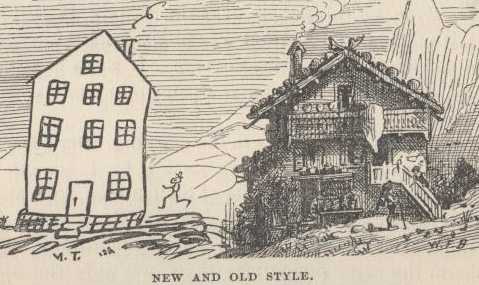
In the course of the morning we passed the spot where Pontius Pilate is said to have thrown himself into the lake. The legend goes that after the Crucifixion his conscience troubled him, and he fled from Jerusalem and wandered about the earth, weary of life and a prey to tortures of the mind. Eventually, he hid himself away, on the heights of Mount Pilatus, and dwelt alone among the clouds and crags for years; but rest and peace were still denied him, so he finally put an end to his misery by drowning himself.
Presently we passed the place where a man of better odor
was born. This was the children's friend, Santa Claus,
or St. Nicholas. There are some unaccountable reputations
in the world. This saint's is an instance. He has
ranked for ages as the peculiar friend of children,
yet it appears he was not much of a friend to his own.
He had ten of them, and when fifty years old he left them,
and sought out as dismal a refuge from the world as possible,
and became a hermit in order that he might reflect upon
pious themes without being disturbed by the joyous and other
noises from the nursery, doubtless.
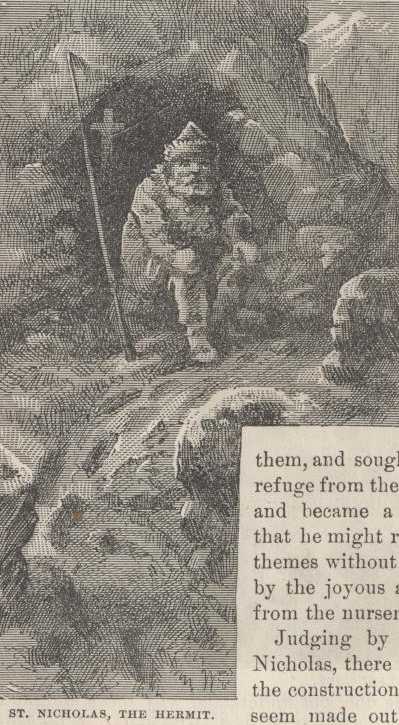
Judging by Pilate and St. Nicholas, there exists no rule
for the construction of hermits; they seem made out of all
kinds of material. But Pilate attended to the matter of
expiating his sin while he was alive, whereas St. Nicholas
will probably have to go on climbing down sooty chimneys,
Christmas eve, forever, and conferring kindness on other
people's children, to make up for deserting his own.
His bones are kept in a church in a village (Sachseln)
which we visited, and are naturally held in great reverence.
His portrait is common in the farmhouses of the region,
but is believed by many to be but an indifferent likeness.
During his hermit life, according to legend, he partook
of the bread and wine of the communion once a month,
but all the rest of the month he fasted.
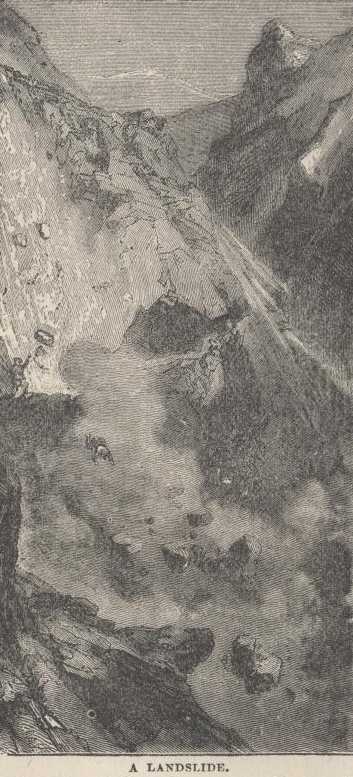
A constant marvel with us, as we sped along the bases
of the steep mountains on this journey, was, not that
avalanches occur, but that they are not occurring all
the time. One does not understand why rocks and landslides
do not plunge down these declivities daily. A landslip
occurred three quarters of a century ago, on the route
from Arth to Brunnen, which was a formidable thing.
A mass of conglomerate two miles long, a thousand feet broad,
and a hundred feet thick, broke away from a cliff three
thousand feet high and hurled itself into the valley below,
burying four villages and five hundred people, as in a grave.
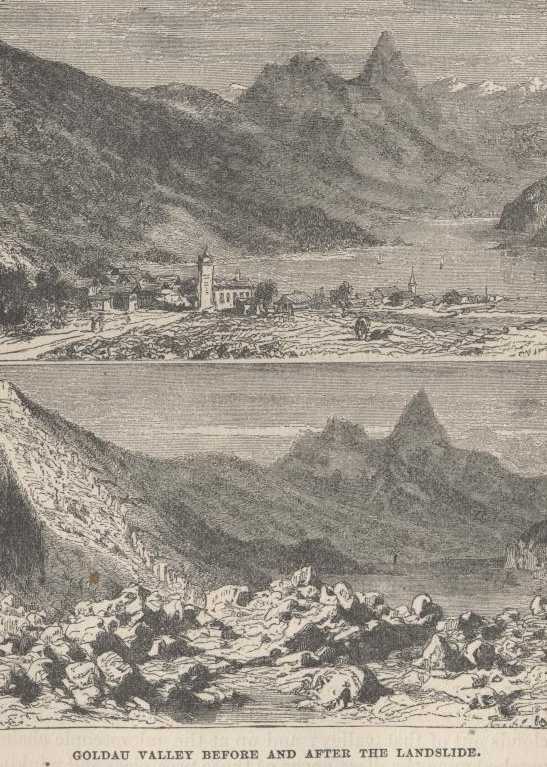
We had such a beautiful day, and such endless pictures of limpid lakes, and green hills and valleys, and majestic mountains, and milky cataracts dancing down the steeps and gleaming in the sun, that we could not help feeling sweet toward all the world; so we tried to drink all the milk, and eat all the grapes and apricots and berries, and buy all the bouquets of wild flowers which the little peasant boys and girls offered for sale; but we had to retire from this contract, for it was too heavy.
At short distances—and they were entirely too short—all along the road, were groups of neat and comely children, with their wares nicely and temptingly set forth in the grass under the shade trees, and as soon as we approached they swarmed into the road, holding out their baskets and milk bottles, and ran beside the carriage, barefoot and bareheaded, and importuned us to buy. They seldom desisted early, but continued to run and insist—beside the wagon while they could, and behind it until they lost breath. Then they turned and chased a returning carriage back to their trading-post again. After several hours of this, without any intermission, it becomes almost annoying. I do not know what we should have done without the returning carriages to draw off the pursuit. However, there were plenty of these, loaded with dusty tourists and piled high with luggage. Indeed, from Lucerne to Interlaken we had the spectacle, among other scenery, of an unbroken procession of fruit-peddlers and tourists carriages.
Our talk was mostly anticipatory of what we should see on the down-grade of the Bruenig, by and by, after we should pass the summit. All our friends in Lucerne had said that to look down upon Meiringen, and the rushing blue-gray river Aar, and the broad level green valley; and across at the mighty Alpine precipices that rise straight up to the clouds out of that valley; and up at the microscopic chalets perched upon the dizzy eaves of those precipices and winking dimly and fitfully through the drifting veil of vapor; and still up and up, at the superb Oltschiback and the other beautiful cascades that leap from those rugged heights, robed in powdery spray, ruffled with foam, and girdled with rainbows—to look upon these things, they say, was to look upon the last possibility of the sublime and the enchanting. Therefore, as I say, we talked mainly of these coming wonders; if we were conscious of any impatience, it was to get there in favorable season; if we felt any anxiety, it was that the day might remain perfect, and enable us to see those marvels at their best.
As we approached the Kaiserstuhl, a part of the harness gave way.
We were in distress for a moment, but only a moment. It was the fore-and-aft gear that was broken—the thing that leads aft from the forward part of the horse and is made fast to the thing that pulls the wagon. In America this would have been a heavy leathern strap; but, all over the continent it is nothing but a piece of rope the size of your little finger—clothes-line is what it is. Cabs use it, private carriages, freight-carts and wagons, all sorts of vehicles have it. In Munich I afterward saw it used on a long wagon laden with fifty-four half-barrels of beer; I had before noticed that the cabs in Heidelberg used it—not new rope, but rope that had been in use since Abraham's time —and I had felt nervous, sometimes, behind it when the cab was tearing down a hill. But I had long been accustomed to it now, and had even become afraid of the leather strap which belonged in its place. Our driver got a fresh piece of clothes-line out of his locker and repaired the break in two minutes.
So much for one European fashion. Every country has its
own ways. It may interest the reader to know how they "put
horses to" on the continent. The man stands up the horses
on each side of the thing that projects from the front end
of the wagon, and then throws the tangled mess of gear
forward through a ring, and hauls it aft, and passes the
other thing through the other ring and hauls it aft on the
other side of the other horse, opposite to the first one,
after crossing them and bringing the loose end back,
and then buckles the other thing underneath the horse,
and takes another thing and wraps it around the thing I spoke
of before, and puts another thing over each horse's head,
with broad flappers to it to keep the dust out of his eyes,
and puts the iron thing in his mouth for him to grit his
teeth on, uphill, and brings the ends of these things aft
over his back, after buckling another one around under
his neck to hold his head up, and hitching another thing
on a thing that goes over his shoulders to keep his head
up when he is climbing a hill, and then takes the slack
of the thing which I mentioned a while ago, and fetches it
aft and makes it fast to the thing that pulls the wagon,
and hands the other things up to the driver to steer with.
I never have buckled up a horse myself, but I do not think
we do it that way.
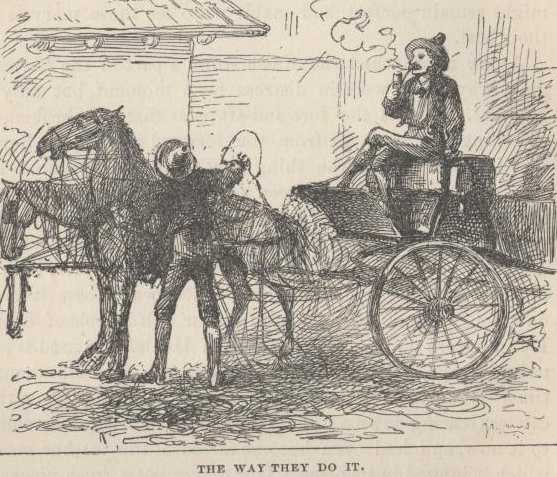
We had four very handsome horses, and the driver was very proud of his turnout. He would bowl along on a reasonable trot, on the highway, but when he entered a village he did it on a furious run, and accompanied it with a frenzy of ceaseless whip-crackings that sounded like volleys of musketry. He tore through the narrow streets and around the sharp curves like a moving earthquake, showering his volleys as he went, and before him swept a continuous tidal wave of scampering children, ducks, cats, and mothers clasping babies which they had snatched out of the way of the coming destruction; and as this living wave washed aside, along the walls, its elements, being safe, forgot their fears and turned their admiring gaze upon that gallant driver till he thundered around the next curve and was lost to sight.
He was a great man to those villagers, with his gaudy
clothes and his terrific ways. Whenever he stopped
to have his cattle watered and fed with loaves of bread,
the villagers stood around admiring him while he
swaggered about, the little boys gazed up at his face with
humble homage, and the landlord brought out foaming mugs
of beer and conversed proudly with him while he drank.
Then he mounted his lofty box, swung his explosive whip,
and away he went again, like a storm. I had not seen
anything like this before since I was a boy, and the
stage used to flourish the village with the dust flying
and the horn tooting.
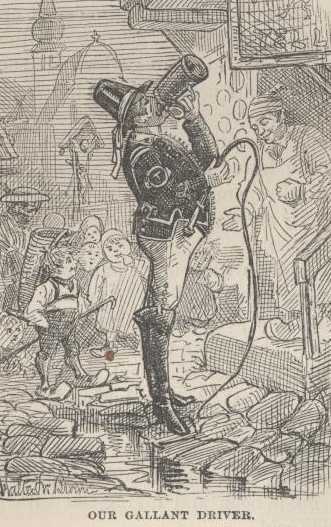
When we reached the base of the Kaiserstuhl, we took two more horses; we had to toil along with difficulty for an hour and a half or two hours, for the ascent was not very gradual, but when we passed the backbone and approached the station, the driver surpassed all his previous efforts in the way of rush and clatter. He could not have six horses all the time, so he made the most of his chance while he had it.
Up to this point we had been in the heart of the William Tell region. The hero is not forgotten, by any means, or held in doubtful veneration. His wooden image, with his bow drawn, above the doors of taverns, was a frequent feature of the scenery.
About noon we arrived at the foot of the Bruenig Pass,
and made a two-hour stop at the village hotel, another of
those clean, pretty, and thoroughly well-kept inns which are
such an astonishment to people who are accustomed to hotels
of a dismally different pattern in remote country-towns.
There was a lake here, in the lap of the great mountains,
the green slopes that rose toward the lower crags
were graced with scattered Swiss cottages nestling
among miniature farms and gardens, and from out a leafy
ambuscade in the upper heights tumbled a brawling cataract.
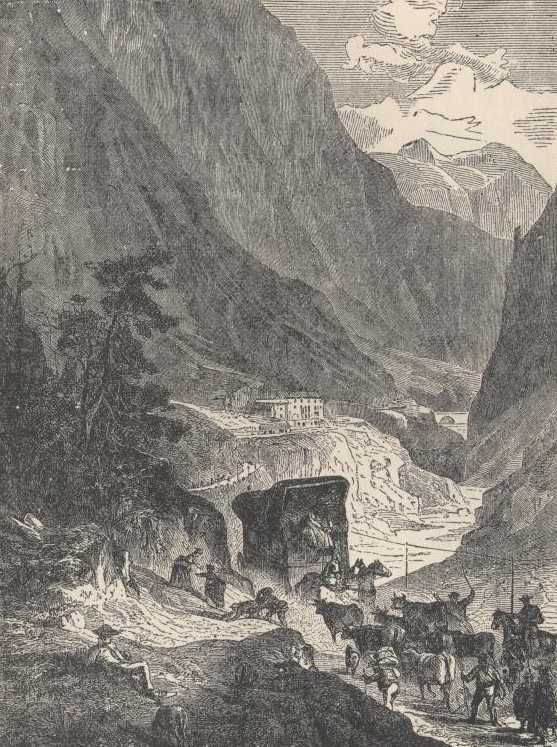
Carriage after carriage, laden with tourists and trunks, arrived, and the quiet hotel was soon populous. We were early at the table d'hôte and saw the people all come in. There were twenty-five, perhaps. They were of various nationalities, but we were the only Americans. Next to me sat an English bride, and next to her sat her new husband, whom she called "Neddy," though he was big enough and stalwart enough to be entitled to his full name. They had a pretty little lovers' quarrel over what wine they should have. Neddy was for obeying the guide-book and taking the wine of the country; but the bride said:
"What, that nahsty stuff!"
"It isn't nahsty, pet, it's quite good."
"It IS nahsty."
"No, it ISN'T nahsty."
"It's Oful nahsty, Neddy, and I shahn't drink it."
Then the question was, what she must have. She said he knew very well that she never drank anything but champagne.
She added:
"You know very well papa always has champagne on his table, and I've always been used to it."
Neddy made a playful pretense of being distressed about the expense, and this amused her so much that she nearly exhausted herself with laughter—and this pleased HIM so much that he repeated his jest a couple of times, and added new and killing varieties to it. When the bride finally recovered, she gave Neddy a love-box on the arm with her fan, and said with arch severity:
"Well, you would HAVE me—nothing else would
do—so you'll have to make the best of a bad bargain.
DO order the champagne, I'm Oful dry."
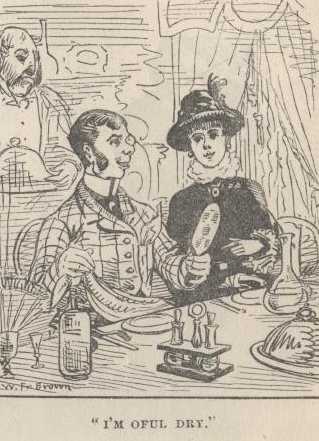
So with a mock groan which made her laugh again, Neddy ordered the champagne.
The fact that this young woman had never moistened the selvedge edge of her soul with a less plebeian tipple than champagne, had a marked and subduing effect on Harris. He believed she belonged to the royal family. But I had my doubts.
We heard two or three different languages spoken by
people at the table and guessed out the nationalities
of most of the guests to our satisfaction, but we
failed with an elderly gentleman and his wife and a
young girl who sat opposite us, and with a gentleman
of about thirty-five who sat three seats beyond Harris.
We did not hear any of these speak. But finally the
last-named gentleman left while we were not noticing,
but we looked up as he reached the far end of the table.
He stopped there a moment, and made his toilet with a
pocket comb. So he was a German; or else he had lived
in German hotels long enough to catch the fashion.
When the elderly couple and the young girl rose to leave,
they bowed respectfully to us. So they were Germans, too.
This national custom is worth six of the other one,
for export.
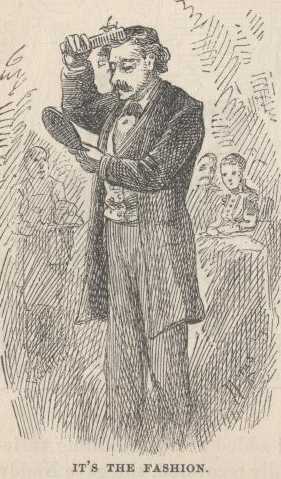
After dinner we talked with several Englishmen, and they
inflamed our desire to a hotter degree than ever,
to see the sights of Meiringen from the heights of
the Bruenig Pass. They said the view was marvelous,
and that one who had seen it once could never forget it.
They also spoke of the romantic nature of the road over
the pass, and how in one place it had been cut through
a flank of the solid rock, in such a way that the mountain
overhung the tourist as he passed by; and they furthermore
said that the sharp turns in the road and the abruptness
of the descent would afford us a thrilling experience,
for we should go down in a flying gallop and seem to be
spinning around the rings of a whirlwind, like a drop
of whiskey descending the spirals of a corkscrew.
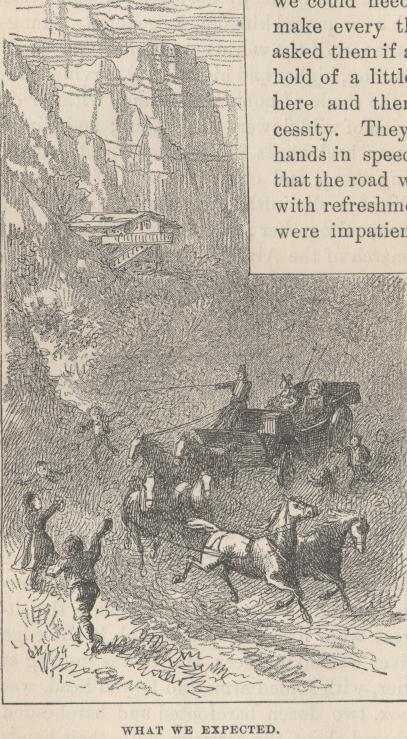
I got all the information out of these gentlemen that we could need; and then, to make everything complete, I asked them if a body could get hold of a little fruit and milk here and there, in case of necessity. They threw up their hands in speechless intimation that the road was simply paved with refreshment-peddlers. We were impatient to get away, now, and the rest of our two-hour stop rather dragged. But finally the set time arrived and we began the ascent. Indeed it was a wonderful road. It was smooth, and compact, and clean, and the side next the precipices was guarded all along by dressed stone posts about three feet high, placed at short distances apart. The road could not have been better built if Napoleon the First had built it. He seems to have been the introducer of the sort of roads which Europe now uses. All literature which describes life as it existed in England, France, and Germany up to the close of the last century, is filled with pictures of coaches and carriages wallowing through these three countries in mud and slush half-wheel deep; but after Napoleon had floundered through a conquered kingdom he generally arranged things so that the rest of the world could follow dry-shod.
We went on climbing, higher and higher, and curving hither and thither, in the shade of noble woods, and with a rich variety and profusion of wild flowers all about us; and glimpses of rounded grassy backbones below us occupied by trim chalets and nibbling sheep, and other glimpses of far lower altitudes, where distance diminished the chalets to toys and obliterated the sheep altogether; and every now and then some ermined monarch of the Alps swung magnificently into view for a moment, then drifted past an intervening spur and disappeared again.
It was an intoxicating trip altogether; the exceeding sense of satisfaction that follows a good dinner added largely to the enjoyment; the having something especial to look forward to and muse about, like the approaching grandeurs of Meiringen, sharpened the zest. Smoking was never so good before, solid comfort was never solider; we lay back against the thick cushions silent, meditative, steeped in felicity.
* * * * * * * *
I rubbed my eyes, opened them, and started. I had been
dreaming I was at sea, and it was a thrilling surprise to wake
up and find land all around me. It took me a couple seconds
to "come to," as you may say; then I took in the situation.
The horses were drinking at a trough in the edge of a town,
the driver was taking beer, Harris was snoring at my side,
the courier, with folded arms and bowed head, was sleeping
on the box, two dozen barefooted and bareheaded children
were gathered about the carriage, with their hands
crossed behind, gazing up with serious and innocent
admiration at the dozing tourists baking there in the sun.
Several small girls held night-capped babies nearly
as big as themselves in their arms, and even these fat
babies seemed to take a sort of sluggish interest in us.
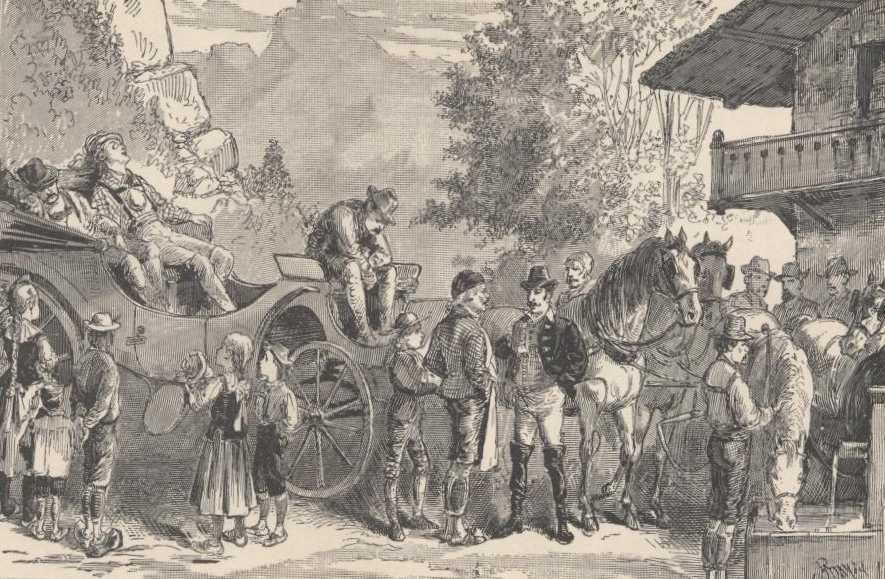
We had slept an hour and a half and missed all the scenery! I did not need anybody to tell me that. If I had been a girl, I could have cursed for vexation. As it was, I woke up the agent and gave him a piece of my mind. Instead of being humiliated, he only upbraided me for being so wanting in vigilance. He said he had expected to improve his mind by coming to Europe, but a man might travel to the ends of the earth with me and never see anything, for I was manifestly endowed with the very genius of ill luck. He even tried to get up some emotion about that poor courier, who never got a chance to see anything, on account of my heedlessness. But when I thought I had borne about enough of this kind of talk, I threatened to make Harris tramp back to the summit and make a report on that scenery, and this suggestion spiked his battery.
We drove sullenly through Brienz, dead to the seductions
of its bewildering array of Swiss carvings and the
clamorous HOO-hooing of its cuckoo clocks, and had not
entirely recovered our spirits when we rattled across
a bridge over the rushing blue river and entered the
pretty town of Interlaken. It was just about sunset,
and we had made the trip from Lucerne in ten hours.
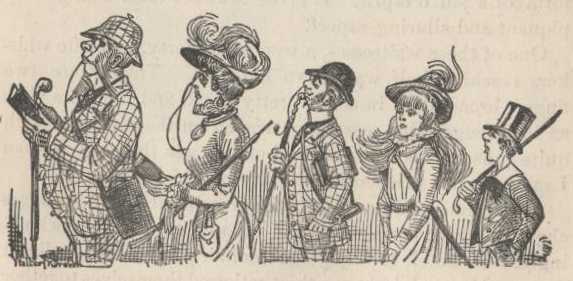
We located ourselves at the Jungfrau Hotel, one of those huge establishments which the needs of modern travel have created in every attractive spot on the continent. There was a great gathering at dinner, and, as usual, one heard all sorts of languages.
The table d'hôte was served by waitresses dressed in the quaint and comely costume of the Swiss peasants. This consists of a simple gros de laine, trimmed with ashes of roses, with overskirt of scare bleu ventre saint gris, cut bias on the off-side, with facings of petit polonaise and narrow insertions of pâte de foie gras backstitched to the mise en sce`ne in the form of a jeu d'esprit. It gives to the wearer a singularly piquant and alluring aspect.
One of these waitresses, a woman of forty, had side-whiskers reaching half-way down her jaws. They were two fingers broad, dark in color, pretty thick, and the hairs were an inch long. One sees many women on the continent with quite conspicuous mustaches, but this was the only woman I saw who had reached the dignity of whiskers.
After dinner the guests of both sexes distributed themselves about the front porches and the ornamental grounds belonging to the hotel, to enjoy the cool air; but, as the twilight deepened toward darkness, they gathered themselves together in that saddest and solemnest and most constrained of all places, the great blank drawing-room which is the chief feature of all continental summer hotels. There they grouped themselves about, in couples and threes, and mumbled in bated voices, and looked timid and homeless and forlorn.
There was a small piano in this room, a clattery, wheezy, asthmatic thing, certainly the very worst miscarriage in the way of a piano that the world has seen. In turn, five or six dejected and homesick ladies approached it doubtingly, gave it a single inquiring thump, and retired with the lockjaw. But the boss of that instrument was to come, nevertheless; and from my own country—from Arkansaw.
She was a brand-new bride, innocent, girlish, happy in herself
and her grave and worshiping stripling of a husband; she was
about eighteen, just out of school, free from affectations,
unconscious of that passionless multitude around her;
and the very first time she smote that old wreck one
recognized that it had met its destiny. Her stripling
brought an armful of aged sheet-music from their
room—for this bride went "heeled," as you might say—and bent
himself lovingly over and got ready to turn the pages.
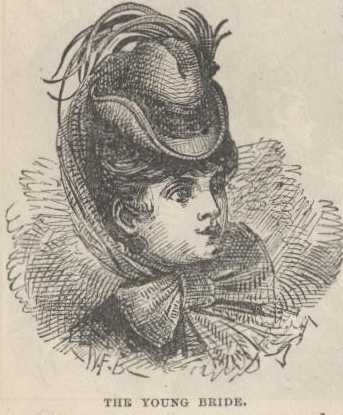
The bride fetched a swoop with her fingers from one end
of the keyboard to the other, just to get her bearings,
as it were, and you could see the congregation set their teeth
with the agony of it. Then, without any more preliminaries,
she turned on all the horrors of the "Battle of Prague,"
that venerable shivaree, and waded chin-deep in the blood
of the slain. She made a fair and honorable average
of two false notes in every five, but her soul was in arms
and she never stopped to correct. The audience stood it
with pretty fair grit for a while, but when the cannonade
waxed hotter and fiercer, and the discord average
rose to four in five, the procession began to move.
A few stragglers held their ground ten minutes longer,
but when the girl began to wring the true inwardness out
of the "cries of the wounded," they struck their colors
and retired in a kind of panic.
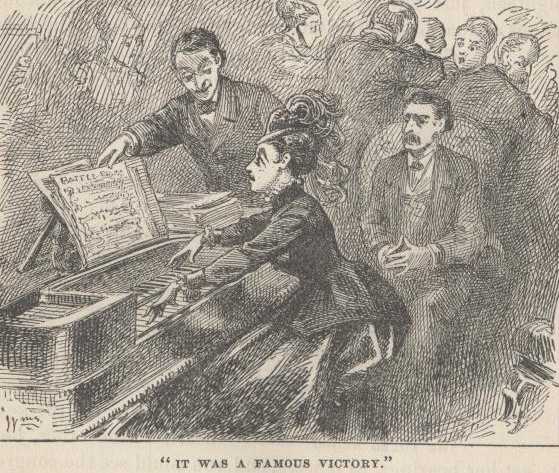
There never was a completer victory; I was the only non-combatant left on the field. I would not have deserted my countrywoman anyhow, but indeed I had no desires in that direction. None of us like mediocrity, but we all reverence perfection. This girl's music was perfection in its way; it was the worst music that had ever been achieved on our planet by a mere human being.
I moved up close, and never lost a strain. When she
got through, I asked her to play it again. She did it
with a pleased alacrity and a heightened enthusiasm.
She made it ALL discords, this time. She got an amount
of anguish into the cries of the wounded that shed a new
light on human suffering. She was on the war-path all
the evening. All the time, crowds of people gathered on
the porches and pressed their noses against the windows
to look and marvel, but the bravest never ventured in.
The bride went off satisfied and happy with her young fellow,
when her appetite was finally gorged, and the tourists
swarmed in again.
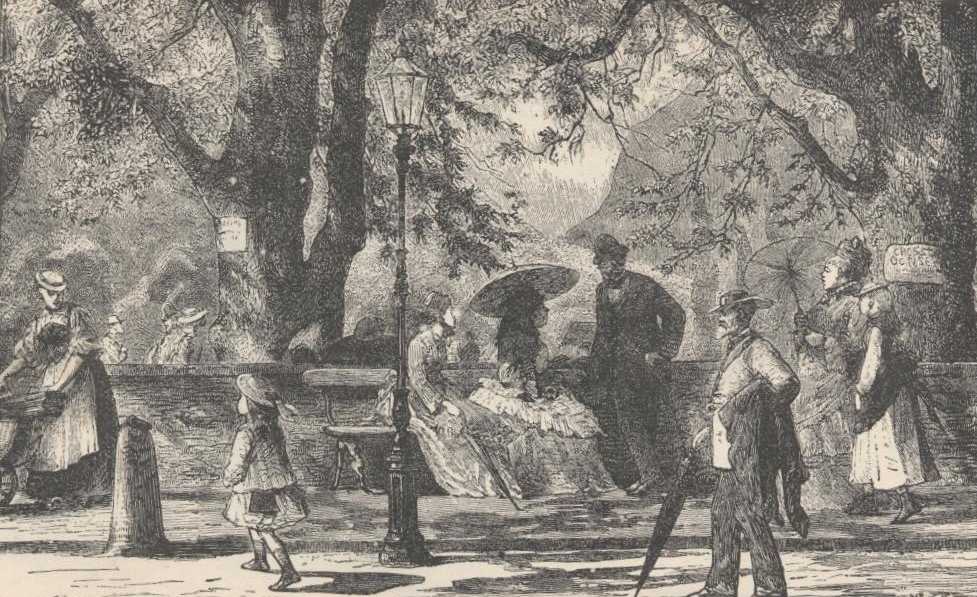
What a change has come over Switzerland, and in fact all Europe, during this century! Seventy or eighty years ago Napoleon was the only man in Europe who could really be called a traveler; he was the only man who had devoted his attention to it and taken a powerful interest in it; he was the only man who had traveled extensively; but now everybody goes everywhere; and Switzerland, and many other regions which were unvisited and unknown remotenesses a hundred years ago, are in our days a buzzing hive of restless strangers every summer. But I digress.
In the morning, when we looked out of our windows, we saw a wonderful sight. Across the valley, and apparently quite neighborly and close at hand, the giant form of the Jungfrau rose cold and white into the clear sky, beyond a gateway in the nearer highlands. It reminded me, somehow, of one of those colossal billows which swells suddenly up beside one's ship, at sea, sometimes, with its crest and shoulders snowy white, and the rest of its noble proportions streaked downward with creamy foam.
I took out my sketch-book and made a little picture of the Jungfrau, merely to get the shape.
I do not regard this as one of my finished works, in fact I
do not rank it among my Works at all; it is only a study;
it is hardly more than what one might call a sketch.
Other artists have done me the grace to admire it; but I
am severe in my judgments of my own pictures, and this
one does not move me.
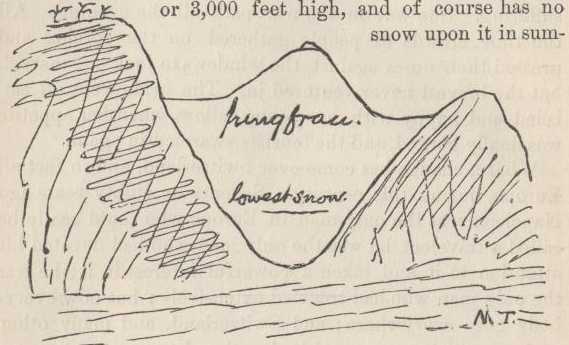
It was hard to believe that that lofty wooded rampart on
the left which so overtops the Jungfrau was not actually
the higher of the two, but it was not, of course.
It is only two or three thousand feet high, and of course
has no snow upon it in summer, whereas the Jungfrau is not
much shorter of fourteen thousand feet high and therefore
that lowest verge of snow on her side, which seems nearly
down to the valley level, is really about seven thousand feet
higher up in the air than the summit of that wooded rampart.
It is the distance that makes the deception. The wooded
height is but four or five miles removed from us,
but the Jungfrau is four or five times that distance away.
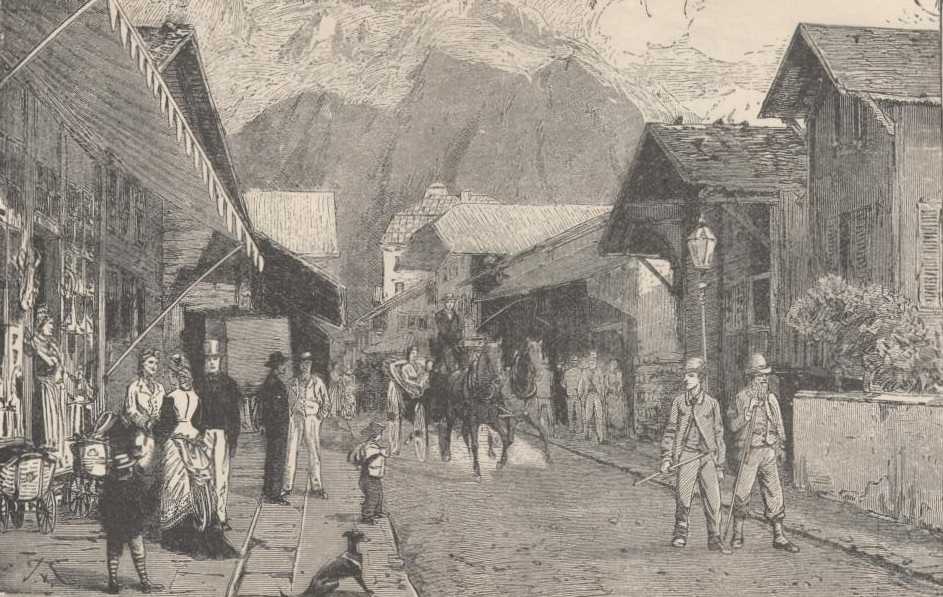
Walking down the street of shops, in the fore-noon, I was attracted by a large picture, carved, frame and all, from a single block of chocolate-colored wood. There are people who know everything. Some of these had told us that continental shopkeepers always raise their prices on English and Americans. Many people had told us it was expensive to buy things through a courier, whereas I had supposed it was just the reverse. When I saw this picture, I conjectured that it was worth more than the friend I proposed to buy it for would like to pay, but still it was worth while to inquire; so I told the courier to step in and ask the price, as if he wanted it for himself; I told him not to speak in English, and above all not to reveal the fact that he was a courier. Then I moved on a few yards, and waited.
The courier came presently and reported the price. I said to myself, "It is a hundred francs too much," and so dismissed the matter from my mind. But in the afternoon I was passing that place with Harris, and the picture attracted me again. We stepped in, to see how much higher broken German would raise the price. The shopwoman named a figure just a hundred francs lower than the courier had named. This was a pleasant surprise. I said I would take it. After I had given directions as to where it was to be shipped, the shopwoman said, appealingly:
"If you please, do not let your courier know you bought it."
This was an unexpected remark. I said:
"What makes you think I have a courier?"
"Ah, that is very simple; he told me himself."
"He was very thoughtful. But tell me—why did you charge him more than you are charging me?"
"That is very simple, also: I do not have to pay you a percentage."
"Oh, I begin to see. You would have had to pay the courier a percentage."
"Undoubtedly. The courier always has his percentage. In this case it would have been a hundred francs."
"Then the tradesman does not pay a part of it—the purchaser pays all of it?"
"There are occasions when the tradesman and the courier agree upon a price which is twice or thrice the value of the article, then the two divide, and both get a percentage."
"I see. But it seems to me that the purchaser does all the paying, even then."
"Oh, to be sure! It goes without saying."
"But I have bought this picture myself; therefore why shouldn't the courier know it?"
The woman exclaimed, in distress:
"Ah, indeed it would take all my little profit! He would come and demand his hundred francs, and I should have to pay."
"He has not done the buying. You could refuse."
"I could not dare to refuse. He would never bring travelers here again. More than that, he would denounce me to the other couriers, they would divert custom from me, and my business would be injured."
I went away in a thoughtful frame of mind. I began to see why a courier could afford to work for fifty-five dollars a month and his fares. A month or two later I was able to understand why a courier did not have to pay any board and lodging, and why my hotel bills were always larger when I had him with me than when I left him behind, somewhere, for a few days.
Another thing was also explained, now, apparently. In one town I had taken the courier to the bank to do the translating when I drew some money. I had sat in the reading-room till the transaction was finished. Then a clerk had brought the money to me in person, and had been exceedingly polite, even going so far as to precede me to the door and holding it open for me and bow me out as if I had been a distinguished personage. It was a new experience. Exchange had been in my favor ever since I had been in Europe, but just that one time. I got simply the face of my draft, and no extra francs, whereas I had expected to get quite a number of them. This was the first time I had ever used the courier at the bank. I had suspected something then, and as long as he remained with me afterward I managed bank matters by myself.
Still, if I felt that I could afford the tax, I would
never travel without a courier, for a good courier is
a convenience whose value cannot be estimated in dollars
and cents. Without him, travel is a bitter harassment,
a purgatory of little exasperating annoyances, a ceaseless
and pitiless punishment—I mean to an irascible man
who has no business capacity and is confused by details.
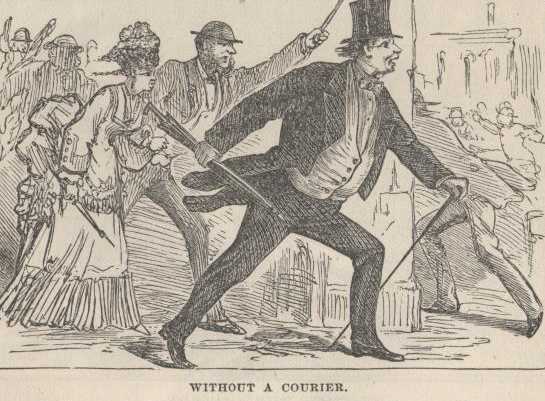
Without a courier, travel hasn't a ray of pleasure in it, anywhere; but with him it is a continuous and unruffled delight. He is always at hand, never has to be sent for; if your bell is not answered promptly—and it seldom is—you have only to open the door and speak, the courier will hear, and he will have the order attended to or raise an insurrection. You tell him what day you will start, and whither you are going—leave all the rest to him. You need not inquire about trains, or fares, or car changes, or hotels, or anything else. At the proper time he will put you in a cab or an omnibus, and drive you to the train or the boat; he has packed your luggage and transferred it, he has paid all the bills. Other people have preceded you half an hour to scramble for impossible places and lose their tempers, but you can take your time; the courier has secured your seats for you, and you can occupy them at your leisure.
At the station, the crowd mash one another to pulp in the
effort to get the weigher's attention to their trunks;
they dispute hotly with these tyrants, who are cool
and indifferent; they get their baggage billets, at last,
and then have another squeeze and another rage over the
disheartening business of trying to get them recorded and
paid for, and still another over the equally disheartening
business of trying to get near enough to the ticket
office to buy a ticket; and now, with their tempers gone
to the dogs, they must stand penned up and packed together,
laden with wraps and satchels and shawl-straps, with the
weary wife and babies, in the waiting-room, till the doors
are thrown open—and then all hands make a grand final
rush to the train, find it full, and have to stand on
the platform and fret until some more cars are put on.
They are in a condition to kill somebody by this time.
Meantime, you have been sitting in your car, smoking,
and observing all this misery in the extremest comfort.
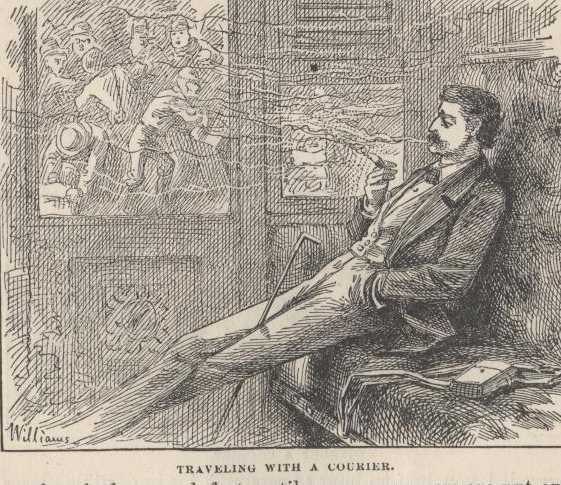
On the journey the guard is polite and watchful—won't allow anybody to get into your compartment—tells them you are just recovering from the small-pox and do not like to be disturbed. For the courier has made everything right with the guard. At way-stations the courier comes to your compartment to see if you want a glass of water, or a newspaper, or anything; at eating-stations he sends luncheon out to you, while the other people scramble and worry in the dining-rooms. If anything breaks about the car you are in, and a station-master proposes to pack you and your agent into a compartment with strangers, the courier reveals to him confidentially that you are a French duke born deaf and dumb, and the official comes and makes affable signs that he has ordered a choice car to be added to the train for you.
At custom-houses the multitude file tediously through, hot and irritated, and look on while the officers burrow into the trunks and make a mess of everything; but you hand your keys to the courier and sit still. Perhaps you arrive at your destination in a rain-storm at ten at night—you generally do. The multitude spend half an hour verifying their baggage and getting it transferred to the omnibuses; but the courier puts you into a vehicle without a moment's loss of time, and when you reach your hotel you find your rooms have been secured two or three days in advance, everything is ready, you can go at once to bed. Some of those other people will have to drift around to two or three hotels, in the rain, before they find accommodations.
I have not set down half of the virtues that are vested in a good courier, but I think I have set down a sufficiency of them to show that an irritable man who can afford one and does not employ him is not a wise economist. My courier was the worst one in Europe, yet he was a good deal better than none at all. It could not pay him to be a better one than he was, because I could not afford to buy things through him. He was a good enough courier for the small amount he got out of his service. Yes, to travel with a courier is bliss, to travel without one is the reverse.
I have had dealings with some very bad couriers; but I have also
had dealings with one who might fairly be called perfection.
He was a young Polander, named Joseph N. Verey. He spoke
eight languages, and seemed to be equally at home in all
of them; he was shrewd, prompt, posted, and punctual;
he was fertile in resources, and singularly gifted in
the matter of overcoming difficulties; he not only knew
how to do everything in his line, but he knew the best ways
and the quickest; he was handy with children and invalids;
all his employer needed to do was to take life easy
and leave everything to the courier. His address is,
care of Messrs. Gay & Son, Strand, London; he was formerly
a conductor of Gay's tourist parties. Excellent couriers
are somewhat rare; if the reader is about to travel,
he will find it to his advantage to make a note of this one.
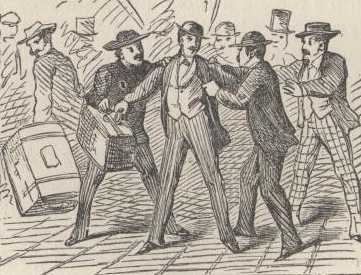
The beautiful Giesbach Fall is near Interlaken, on the other side of the lake of Brienz, and is illuminated every night with those gorgeous theatrical fires whose name I cannot call just at this moment. This was said to be a spectacle which the tourist ought by no means to miss. I was strongly tempted, but I could not go there with propriety, because one goes in a boat. The task which I had set myself was to walk over Europe on foot, not skim over it in a boat. I had made a tacit contract with myself; it was my duty to abide by it. I was willing to make boat trips for pleasure, but I could not conscientiously make them in the way of business.
It cost me something of a pang to lose that fine sight, but I lived down the desire, and gained in my self-respect through the triumph. I had a finer and a grander sight, however, where I was. This was the mighty dome of the Jungfrau softly outlined against the sky and faintly silvered by the starlight. There was something subduing in the influence of that silent and solemn and awful presence; one seemed to meet the immutable, the indestructible, the eternal, face to face, and to feel the trivial and fleeting nature of his own existence the more sharply by the contrast. One had the sense of being under the brooding contemplation of a spirit, not an inert mass of rocks and ice—a spirit which had looked down, through the slow drift of the ages, upon a million vanished races of men, and judged them; and would judge a million more—and still be there, watching, unchanged and unchangeable, after all life should be gone and the earth have become a vacant desolation.
While I was feeling these things, I was groping, without knowing it, toward an understanding of what the spell is which people find in the Alps, and in no other mountains—that strange, deep, nameless influence, which, once felt, cannot be forgotten—once felt, leaves always behind it a restless longing to feel it again—a longing which is like homesickness; a grieving, haunting yearning which will plead, implore, and persecute till it has its will. I met dozens of people, imaginative and unimaginative, cultivated and uncultivated, who had come from far countries and roamed through the Swiss Alps year after year—they could not explain why. They had come first, they said, out of idle curiosity, because everybody talked about it; they had come since because they could not help it, and they should keep on coming, while they lived, for the same reason; they had tried to break their chains and stay away, but it was futile; now, they had no desire to break them. Others came nearer formulating what they felt; they said they could find perfect rest and peace nowhere else when they were troubled: all frets and worries and chafings sank to sleep in the presence of the benignant serenity of the Alps; the Great Spirit of the Mountain breathed his own peace upon their hurt minds and sore hearts, and healed them; they could not think base thoughts or do mean and sordid things here, before the visible throne of God.
Down the road a piece was a Kursaal—whatever that may
be—and we joined the human tide to see what sort of enjoyment
it might afford. It was the usual open-air concert,
in an ornamental garden, with wines, beer, milk, whey,
grapes, etc.—the whey and the grapes being necessaries
of life to certain invalids whom physicians cannot repair,
and who only continue to exist by the grace of whey
or grapes. One of these departed spirits told me,
in a sad and lifeless way, that there is no way for him
to live but by whey, and dearly, dearly loved whey,
he didn't know whey he did, but he did. After making
this pun he died—that is the whey it served him.
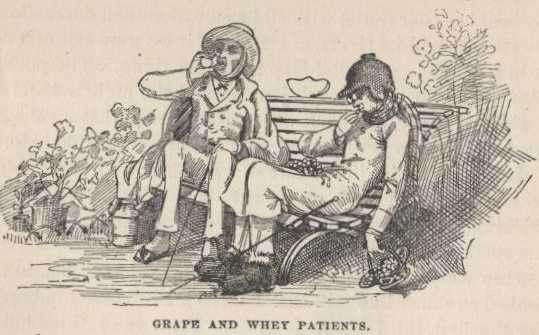
Some other remains, preserved from decomposition by the grape system, told me that the grapes were of a peculiar breed, highly medicinal in their nature, and that they were counted out and administered by the grape-doctors as methodically as if they were pills. The new patient, if very feeble, began with one grape before breakfast, took three during breakfast, a couple between meals, five at luncheon, three in the afternoon, seven at dinner, four for supper, and part of a grape just before going to bed, by way of a general regulator. The quantity was gradually and regularly increased, according to the needs and capacities of the patient, until by and by you would find him disposing of his one grape per second all the day long, and his regular barrel per day.
He said that men cured in this way, and enabled to discard the grape system, never afterward got over the habit of talking as if they were dictating to a slow amanuensis, because they always made a pause between each two words while they sucked the substance out of an imaginary grape. He said these were tedious people to talk with. He said that men who had been cured by the other process were easily distinguished from the rest of mankind because they always tilted their heads back, between every two words, and swallowed a swig of imaginary whey. He said it was an impressive thing to observe two men, who had been cured by the two processes, engaged in conversation—said their pauses and accompanying movements were so continuous and regular that a stranger would think himself in the presence of a couple of automatic machines. One finds out a great many wonderful things, by traveling, if he stumbles upon the right person.
I did not remain long at the Kursaal; the music was good enough, but it seemed rather tame after the cyclone of that Arkansaw expert. Besides, my adventurous spirit had conceived a formidable enterprise—nothing less than a trip from Interlaken, by the Gemmi and Visp, clear to Zermatt, on foot! So it was necessary to plan the details, and get ready for an early start. The courier (this was not the one I have just been speaking of) thought that the portier of the hotel would be able to tell us how to find our way. And so it turned out. He showed us the whole thing, on a relief-map, and we could see our route, with all its elevations and depressions, its villages and its rivers, as clearly as if we were sailing over it in a balloon. A relief-map is a great thing. The portier also wrote down each day's journey and the nightly hotel on a piece of paper, and made our course so plain that we should never be able to get lost without high-priced outside help.
I put the courier in the care of a gentleman who was going to Lausanne, and then we went to bed, after laying out the walking-costumes and putting them into condition for instant occupation in the morning.
However, when we came down to breakfast at 8 A.M., it looked so much like rain that I hired a two-horse top-buggy for the first third of the journey. For two or three hours we jogged along the level road which skirts the beautiful lake of Thun, with a dim and dreamlike picture of watery expanses and spectral Alpine forms always before us, veiled in a mellowing mist. Then a steady downpour set in, and hid everything but the nearest objects. We kept the rain out of our faces with umbrellas, and away from our bodies with the leather apron of the buggy; but the driver sat unsheltered and placidly soaked the weather in and seemed to like it. We had the road to ourselves, and I never had a pleasanter excursion.
The weather began to clear while we were driving up a valley called the Kienthal, and presently a vast black cloud-bank in front of us dissolved away and uncurtained the grand proportions and the soaring loftiness of the Blumis Alp. It was a sort of breath-taking surprise; for we had not supposed there was anything behind that low-hung blanket of sable cloud but level valley. What we had been mistaking for fleeting glimpses of sky away aloft there, were really patches of the Blumis's snowy crest caught through shredded rents in the drifting pall of vapor.
We dined in the inn at Frutigen, and our driver ought
to have dined there, too, but he would not have had
time to dine and get drunk both, so he gave his mind
to making a masterpiece of the latter, and succeeded.
A German gentleman and his two young-lady daughters had
been taking their nooning at the inn, and when they left,
just ahead of us, it was plain that their driver was
as drunk as ours, and as happy and good-natured, too,
which was saying a good deal. These rascals overflowed
with attentions and information for their guests, and with
brotherly love for each other. They tied their reins,
and took off their coats and hats, so that they might
be able to give unencumbered attention to conversation
and to the gestures necessary for its illustration.
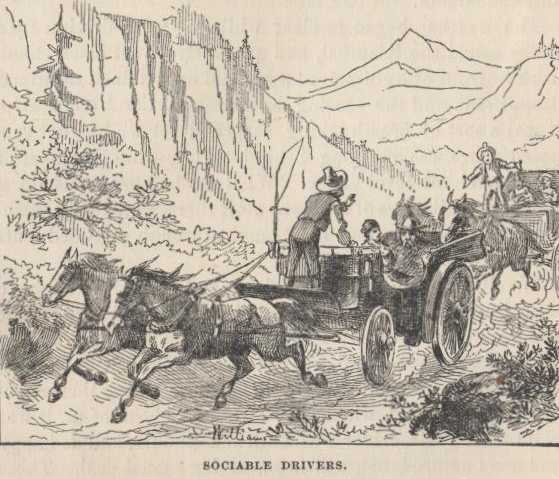
The road was smooth; it led up and over and down a continual succession of hills; but it was narrow, the horses were used to it, and could not well get out of it anyhow; so why shouldn't the drivers entertain themselves and us? The noses of our horses projected sociably into the rear of the forward carriage, and as we toiled up the long hills our driver stood up and talked to his friend, and his friend stood up and talked back to him, with his rear to the scenery. When the top was reached and we went flying down the other side, there was no change in the program. I carry in my memory yet the picture of that forward driver, on his knees on his high seat, resting his elbows on its back, and beaming down on his passengers, with happy eye, and flying hair, and jolly red face, and offering his card to the old German gentleman while he praised his hack and horses, and both teams were whizzing down a long hill with nobody in a position to tell whether we were bound to destruction or an undeserved safety.
Toward sunset we entered a beautiful green valley dotted
with chalets, a cozy little domain hidden away from the busy
world in a cloistered nook among giant precipices topped
with snowy peaks that seemed to float like islands above
the curling surf of the sea of vapor that severed them from
the lower world. Down from vague and vaporous heights,
little ruffled zigzag milky currents came crawling,
and found their way to the verge of one of those tremendous
overhanging walls, whence they plunged, a shaft of silver,
shivered to atoms in mid-descent and turned to an air puff
of luminous dust. Here and there, in grooved depressions
among the snowy desolations of the upper altitudes,
one glimpsed the extremity of a glacier, with its sea-green
and honeycombed battlements of ice.
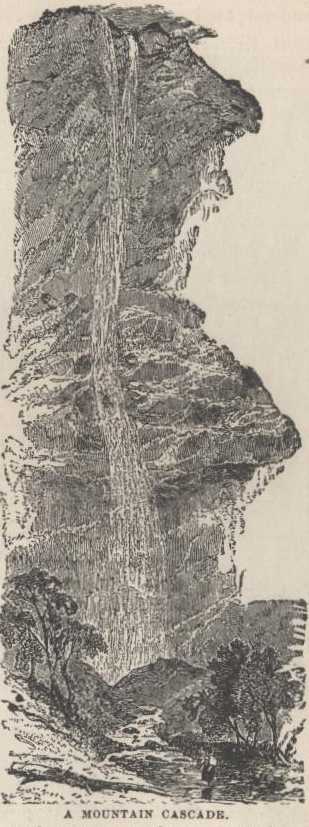
Up the valley, under a dizzy precipice, nestled the village of Kandersteg, our halting-place for the night. We were soon there, and housed in the hotel. But the waning day had such an inviting influence that we did not remain housed many moments, but struck out and followed a roaring torrent of ice-water up to its far source in a sort of little grass-carpeted parlor, walled in all around by vast precipices and overlooked by clustering summits of ice. This was the snuggest little croquet-ground imaginable; it was perfectly level, and not more than a mile long by half a mile wide. The walls around it were so gigantic, and everything about it was on so mighty a scale that it was belittled, by contrast, to what I have likened it to—a cozy and carpeted parlor. It was so high above the Kandersteg valley that there was nothing between it and the snowy-peaks. I had never been in such intimate relations with the high altitudes before; the snow-peaks had always been remote and unapproachable grandeurs, hitherto, but now we were hob-a-nob—if one may use such a seemingly irreverent expression about creations so august as these.
We could see the streams which fed the torrent we
had followed issuing from under the greenish ramparts
of glaciers; but two or three of these, instead of flowing
over the precipices, sank down into the rock and sprang
in big jets out of holes in the mid-face of the walls.
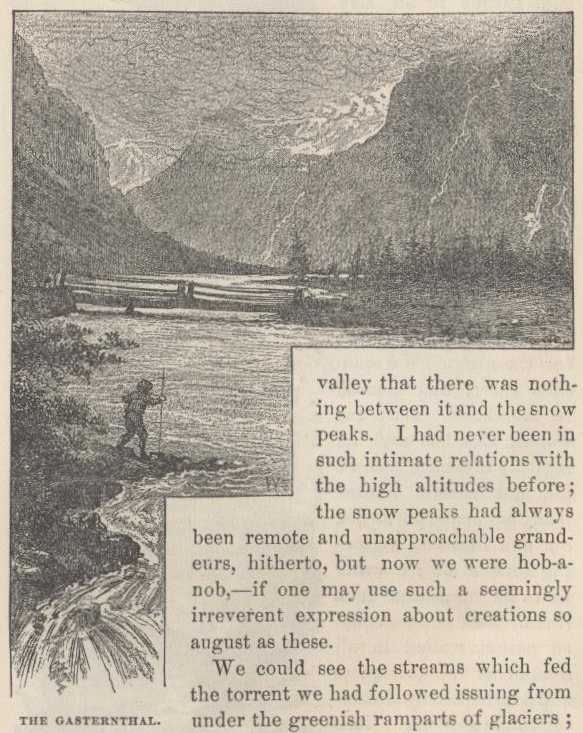
The green nook which I have been describing is called the Gasternthal. The glacier streams gather and flow through it in a broad and rushing brook to a narrow cleft between lofty precipices; here the rushing brook becomes a mad torrent and goes booming and thundering down toward Kandersteg, lashing and thrashing its way over and among monster boulders, and hurling chance roots and logs about like straws. There was no lack of cascades along this route. The path by the side of the torrent was so narrow that one had to look sharp, when he heard a cow-bell, and hunt for a place that was wide enough to accommodate a cow and a Christian side by side, and such places were not always to be had at an instant's notice. The cows wear church-bells, and that is a good idea in the cows, for where that torrent is, you couldn't hear an ordinary cow-bell any further than you could hear the ticking of a watch.
I needed exercise, so I employed my agent in setting
stranded logs and dead trees adrift, and I sat on a
boulder and watched them go whirling and leaping head
over heels down the boiling torrent. It was a wonderfully
exhilarating spectacle. When I had had enough exercise,
I made the agent take some, by running a race with one
of those logs. I made a trifle by betting on the log.
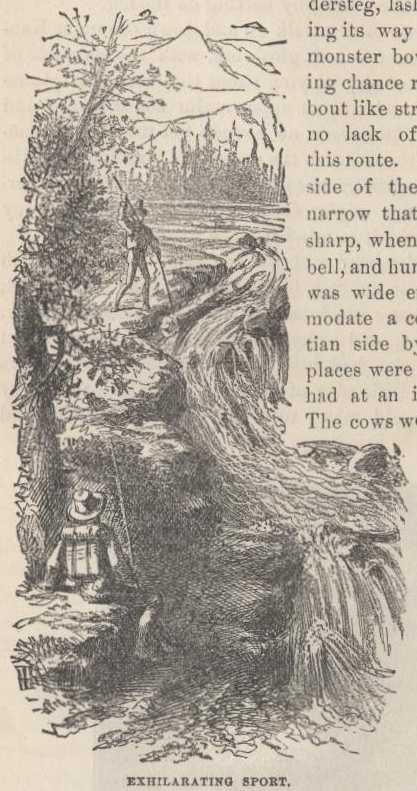
After dinner we had a walk up and down the Kandersteg valley, in the soft gloaming, with the spectacle of the dying lights of day playing about the crests and pinnacles of the still and solemn upper realm for contrast, and text for talk. There were no sounds but the dulled complaining of the torrent and the occasional tinkling of a distant bell. The spirit of the place was a sense of deep, pervading peace; one might dream his life tranquilly away there, and not miss it or mind it when it was gone.
The summer departed with the sun, and winter came with
the stars. It grew to be a bitter night in that little hotel,
backed up against a precipice that had no visible top to it,
but we kept warm, and woke in time in the morning to find
that everybody else had left for Gemmi three hours
before—so our little plan of helping that German family (principally
the old man) over the pass, was a blocked generosity.
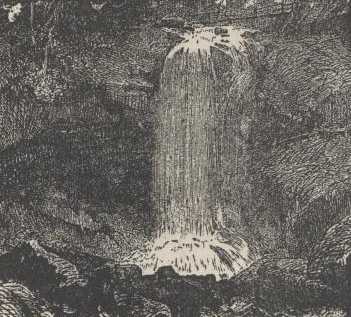
We hired the only guide left, to lead us on our way. He was over seventy, but he could have given me nine-tenths of his strength and still had all his age entitled him to. He shouldered our satchels, overcoats, and alpenstocks, and we set out up the steep path. It was hot work. The old man soon begged us to hand over our coats and waistcoats to him to carry, too, and we did it; one could not refuse so little a thing to a poor old man like that; he should have had them if he had been a hundred and fifty.
When we began that ascent, we could see a microscopic
chalet perched away up against heaven on what seemed
to be the highest mountain near us. It was on our right,
across the narrow head of the valley. But when we got
up abreast it on its own level, mountains were towering
high above on every hand, and we saw that its altitude
was just about that of the little Gasternthal which we had
visited the evening before. Still it seemed a long way up
in the air, in that waste and lonely wilderness of rocks.
It had an unfenced grass-plot in front of it which seemed
about as big as a billiard-table, and this grass-plot
slanted so sharply downward, and was so brief, and ended
so exceedingly soon at the verge of the absolute precipice,
that it was a shuddery thing to think of a person's venturing
to trust his foot on an incline so situated at all.
Suppose a man stepped on an orange peel in that yard;
there would be nothing for him to seize; nothing could
keep him from rolling; five revolutions would bring him
to the edge, and over he would go.
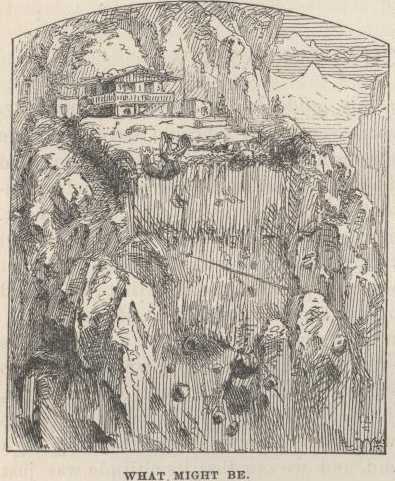
What a frightful distance he would fall!—for there are very few birds that fly as high as his starting-point. He would strike and bounce, two or three times, on his way down, but this would be no advantage to him. I would as soon take an airing on the slant of a rainbow as in such a front yard. I would rather, in fact, for the distance down would be about the same, and it is pleasanter to slide than to bounce. I could not see how the peasants got up to that chalet—the region seemed too steep for anything but a balloon.
As we strolled on, climbing up higher and higher, we were continually bringing neighboring peaks into view and lofty prominence which had been hidden behind lower peaks before; so by and by, while standing before a group of these giants, we looked around for the chalet again; there it was, away down below us, apparently on an inconspicuous ridge in the valley! It was as far below us, now, as it had been above us when we were beginning the ascent.
After a while the path led us along a railed precipice, and we looked over—far beneath us was the snug parlor again, the little Gasternthal, with its water jets spouting from the face of its rock walls. We could have dropped a stone into it. We had been finding the top of the world all along—and always finding a still higher top stealing into view in a disappointing way just ahead; when we looked down into the Gasternthal we felt pretty sure that we had reached the genuine top at last, but it was not so; there were much higher altitudes to be scaled yet. We were still in the pleasant shade of forest trees, we were still in a region which was cushioned with beautiful mosses and aglow with the many-tinted luster of innumerable wild flowers.
We found, indeed, more interest in the wild flowers
than in anything else. We gathered a specimen or two
of every kind which we were unacquainted with; so we
had sumptuous bouquets. But one of the chief interests
lay in chasing the seasons of the year up the mountain,
and determining them by the presence of flowers and
berries which we were acquainted with. For instance,
it was the end of August at the level of the sea;
in the Kandersteg valley at the base of the pass,
we found flowers which would not be due at the sea-level
for two or three weeks; higher up, we entered October,
and gathered fringed gentians. I made no notes, and have
forgotten the details, but the construction of the floral
calendar was very entertaining while it lasted.
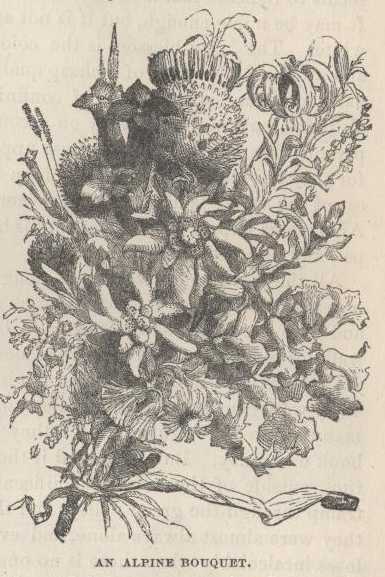
In the high regions we found rich store of the splendid red flower called the Alpine rose, but we did not find any examples of the ugly Swiss favorite called Edelweiss. Its name seems to indicate that it is a noble flower and that it is white. It may be noble enough, but it is not attractive, and it is not white. The fuzzy blossom is the color of bad cigar ashes, and appears to be made of a cheap quality of gray plush. It has a noble and distant way of confining itself to the high altitudes, but that is probably on account of its looks; it apparently has no monopoly of those upper altitudes, however, for they are sometimes intruded upon by some of the loveliest of the valley families of wild flowers. Everybody in the Alps wears a sprig of Edelweiss in his hat. It is the native's pet, and also the tourist's.
All the morning, as we loafed along, having a good time, other pedestrians went staving by us with vigorous strides, and with the intent and determined look of men who were walking for a wager. These wore loose knee-breeches, long yarn stockings, and hobnailed high-laced walking-shoes. They were gentlemen who would go home to England or Germany and tell how many miles they had beaten the guide-book every day. But I doubted if they ever had much real fun, outside of the mere magnificent exhilaration of the tramp through the green valleys and the breezy heights; for they were almost always alone, and even the finest scenery loses incalculably when there is no one to enjoy it with.
All the morning an endless double procession of mule-mounted tourists filed past us along the narrow path—the one procession going, the other coming. We had taken a good deal of trouble to teach ourselves the kindly German custom of saluting all strangers with doffed hat, and we resolutely clung to it, that morning, although it kept us bareheaded most of the time and was not always responded to. Still we found an interest in the thing, because we naturally liked to know who were English and Americans among the passers-by. All continental natives responded of course; so did some of the English and Americans, but, as a general thing, these two races gave no sign. Whenever a man or a woman showed us cold neglect, we spoke up confidently in our own tongue and asked for such information as we happened to need, and we always got a reply in the same language. The English and American folk are not less kindly than other races, they are only more reserved, and that comes of habit and education. In one dreary, rocky waste, away above the line of vegetation, we met a procession of twenty-five mounted young men, all from America. We got answering bows enough from these, of course, for they were of an age to learn to do in Rome as Rome does, without much effort.
At one extremity of this patch of desolation, overhung by bare
and forbidding crags which husbanded drifts of everlasting
snow in their shaded cavities, was a small stretch
of thin and discouraged grass, and a man and a family
of pigs were actually living here in some shanties.
Consequently this place could be really reckoned as
"property"; it had a money value, and was doubtless taxed.
I think it must have marked the limit of real estate
in this world. It would be hard to set a money value
upon any piece of earth that lies between that spot
and the empty realm of space. That man may claim the
distinction of owning the end of the world, for if there
is any definite end to the world he has certainly found it.
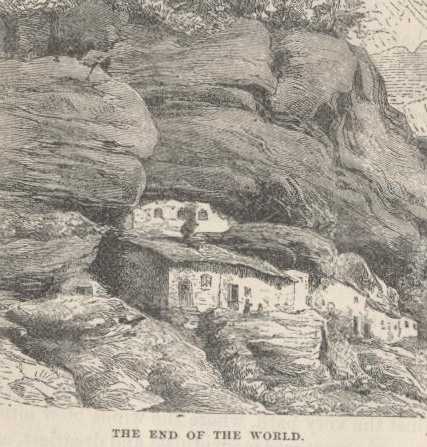
From here forward we moved through a storm-swept and smileless desolation. All about us rose gigantic masses, crags, and ramparts of bare and dreary rock, with not a vestige or semblance of plant or tree or flower anywhere, or glimpse of any creature that had life. The frost and the tempests of unnumbered ages had battered and hacked at these cliffs, with a deathless energy, destroying them piecemeal; so all the region about their bases was a tumbled chaos of great fragments which had been split off and hurled to the ground. Soiled and aged banks of snow lay close about our path. The ghastly desolation of the place was as tremendously complete as if Doré had furnished the working-plans for it. But every now and then, through the stern gateways around us we caught a view of some neighboring majestic dome, sheathed with glittering ice, and displaying its white purity at an elevation compared to which ours was groveling and plebeian, and this spectacle always chained one's interest and admiration at once, and made him forget there was anything ugly in the world.
I have just said that there was nothing but death
and desolation in these hideous places, but I forgot.
In the most forlorn and arid and dismal one of all,
where the racked and splintered debris was thickest,
where the ancient patches of snow lay against the very path,
where the winds blew bitterest and the general aspect was
mournfulest and dreariest, and furthest from any suggestion
of cheer or hope, I found a solitary wee forget-me-not
flourishing away, not a droop about it anywhere,
but holding its bright blue star up with the prettiest
and gallantest air in the world, the only happy spirit,
the only smiling thing, in all that grisly desert.
She seemed to say, "Cheer up!—as long as we are here,
let us make the best of it." I judged she had earned
a right to a more hospitable place; so I plucked her up
and sent her to America to a friend who would respect
her for the fight she had made, all by her small self,
to make a whole vast despondent Alpine desolation stop
breaking its heart over the unalterable, and hold up its
head and look at the bright side of things for once.
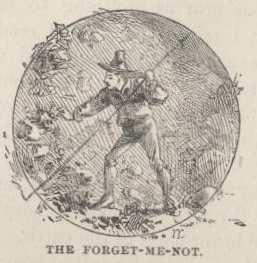
We stopped for a nooning at a strongly built little inn called the Schwarenbach. It sits in a lonely spot among the peaks, where it is swept by the trailing fringes of the cloud-rack, and is rained on, and snowed on, and pelted and persecuted by the storms, nearly every day of its life. It was the only habitation in the whole Gemmi Pass.
Close at hand, now, was a chance for a blood-curdling Alpine adventure. Close at hand was the snowy mass of the Great Altels cooling its topknot in the sky and daring us to an ascent. I was fired with the idea, and immediately made up my mind to procure the necessary guides, ropes, etc., and undertake it. I instructed Harris to go to the landlord of the inn and set him about our preparations. Meantime, I went diligently to work to read up and find out what this much-talked-of mountain-climbing was like, and how one should go about it—for in these matters I was ignorant. I opened Mr. Hinchliff's SUMMER MONTHS AMONG THE ALPS (published 1857), and selected his account of his ascent of Monte Rosa.
It began:
"It is very difficult to free the mind from excitement on the evening before a grand expedition—"
I saw that I was too calm; so I walked the room a while
and worked myself into a high excitement; but the book's
next remark —that the adventurer must get up at two
in the morning—came as near as anything to flatting it
all out again. However, I reinforced it, and read on,
about how Mr. Hinchliff dressed by candle-light and was "soon
down among the guides, who were bustling about in the passage,
packing provisions, and making every preparation for the start";
and how he glanced out into the cold clear night and saw
that—
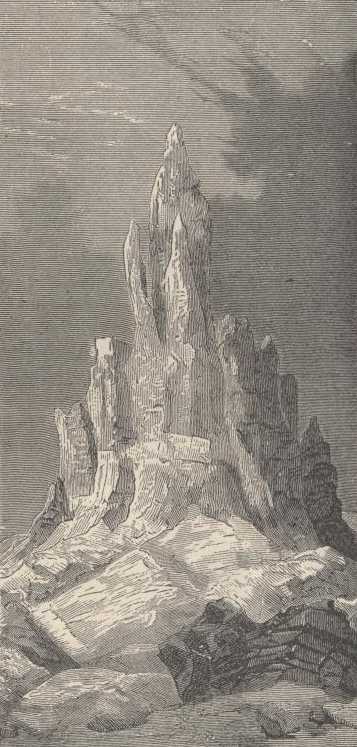
"The whole sky was blazing with stars, larger and brighter than they appear through the dense atmosphere breathed by inhabitants of the lower parts of the earth. They seemed actually suspended from the dark vault of heaven, and their gentle light shed a fairylike gleam over the snow-fields around the foot of the Matterhorn, which raised its stupendous pinnacle on high, penetrating to the heart of the Great Bear, and crowning itself with a diadem of his magnificent stars. Not a sound disturbed the deep tranquillity of the night, except the distant roar of streams which rush from the high plateau of the St. Theodule glacier, and fall headlong over precipitous rocks till they lose themselves in the mazes of the Gorner glacier."
He took his hot toast and coffee, and then about half past three his caravan of ten men filed away from the Riffel Hotel, and began the steep climb. At half past five he happened to turn around, and "beheld the glorious spectacle of the Matterhorn, just touched by the rosy-fingered morning, and looking like a huge pyramid of fire rising out of the barren ocean of ice and rock around it." Then the Breithorn and the Dent Blanche caught the radiant glow; but "the intervening mass of Monte Rosa made it necessary for us to climb many long hours before we could hope to see the sun himself, yet the whole air soon grew warmer after the splendid birth of the day."
He gazed at the lofty crown of Monte Rosa and the wastes of snow that guarded its steep approaches, and the chief guide delivered the opinion that no man could conquer their awful heights and put his foot upon that summit. But the adventurers moved steadily on, nevertheless.
They toiled up, and up, and still up; they passed
the Grand Plateau; then toiled up a steep shoulder
of the mountain, clinging like flies to its rugged face;
and now they were confronted by a tremendous wall from
which great blocks of ice and snow were evidently in the
habit of falling. They turned aside to skirt this wall,
and gradually ascended until their way was barred by a "maze
of gigantic snow crevices,"—so they turned aside again,
and "began a long climb of sufficient steepness to make
a zigzag course necessary."
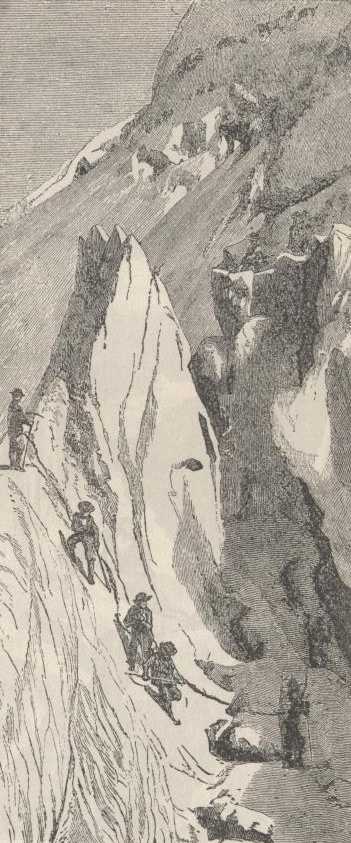
Fatigue compelled them to halt frequently, for a moment or two. At one of these halts somebody called out, "Look at Mont Blanc!" and "we were at once made aware of the very great height we had attained by actually seeing the monarch of the Alps and his attendant satellites right over the top of the Breithorn, itself at least 14,000 feet high!"
These people moved in single file, and were all tied
to a strong rope, at regular distances apart, so that if
one of them slipped on those giddy heights, the others
could brace themselves on their alpenstocks and save him
from darting into the valley, thousands of feet below.
By and by they came to an ice-coated ridge which was tilted
up at a sharp angle, and had a precipice on one side of it.
They had to climb this, so the guide in the lead cut
steps in the ice with his hatchet, and as fast as he
took his toes out of one of these slight holes, the toes
of the man behind him occupied it.
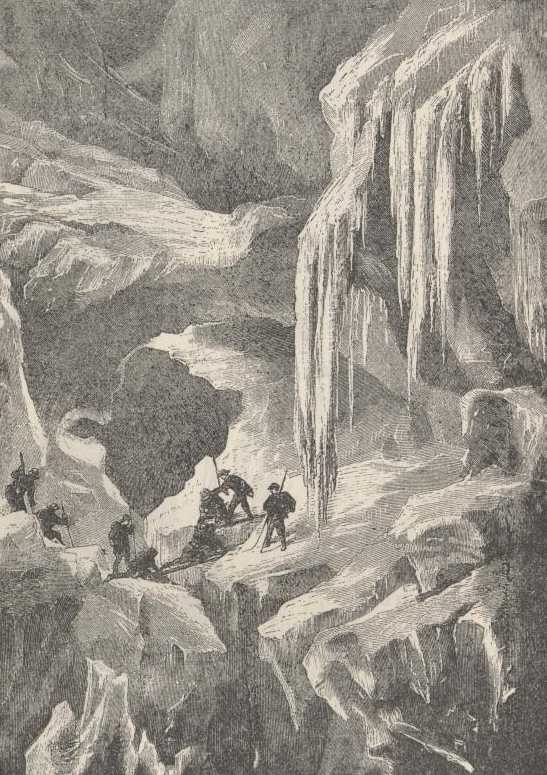
"Slowly and steadily we kept on our way over this dangerous part of the ascent, and I dare say it was fortunate for some of us that attention was distracted from the head by the paramount necessity of looking after the feet; FOR, WHILE ON THE LEFT THE INCLINE OF ICE WAS SO STEEP THAT IT WOULD BE IMPOSSIBLE FOR ANY MAN TO SAVE HIMSELF IN CASE OF A SLIP, UNLESS THE OTHERS COULD HOLD HIM UP, ON THE RIGHT WE MIGHT DROP A PEBBLE FROM THE HAND OVER PRECIPICES OF UNKNOWN EXTENT DOWN UPON THE TREMENDOUS GLACIER BELOW.
"Great caution, therefore, was absolutely necessary, and in this exposed situation we were attacked by all the fury of that grand enemy of aspirants to Monte Rosa—a severe and bitterly cold wind from the north. The fine powdery snow was driven past us in the clouds, penetrating the interstices of our clothes, and the pieces of ice which flew from the blows of Peter's ax were whisked into the air, and then dashed over the precipice. We had quite enough to do to prevent ourselves from being served in the same ruthless fashion, and now and then, in the more violent gusts of wind, were glad to stick our alpenstocks into the ice and hold on hard."
Having surmounted this perilous steep, they sat down and took a brief rest with their backs against a sheltering rock and their heels dangling over a bottomless abyss; then they climbed to the base of another ridge—a more difficult and dangerous one still:
"The whole of the ridge was exceedingly narrow, and the
fall on each side desperately steep, but the ice in some
of these intervals between the masses of rock assumed
the form of a mere sharp edge, almost like a knife;
these places, though not more than three or four short
paces in length, looked uncommonly awkward; but, like the
sword leading true believers to the gates of Paradise,
they must needs be passed before we could attain to
the summit of our ambition. These were in one or two
places so narrow, that in stepping over them with toes
well turned out for greater security, ONE END OF THE
FOOT PROJECTED OVER THE AWFUL PRECIPICE ON THE RIGHT,
WHILE THE OTHER WAS ON THE BEGINNING OF THE ICE SLOPE ON
THE LEFT, WHICH WAS SCARCELY LESS STEEP THAN THE ROCKS.
On these occasions Peter would take my hand, and each
of us stretching as far as we could, he was thus enabled
to get a firm footing two paces or rather more from me,
whence a spring would probably bring him to the rock
on the other side; then, turning around, he called
to me to come, and, taking a couple of steps carefully,
I was met at the third by his outstretched hand ready
to clasp mine, and in a moment stood by his side.
The others followed in much the same fashion. Once my
right foot slipped on the side toward the precipice,
but I threw out my left arm in a moment so that it caught
the icy edge under my armpit as I fell, and supported
me considerably; at the same instant I cast my eyes
down the side on which I had slipped, and contrived
to plant my right foot on a piece of rock as large as a
cricket-ball, which chanced to protrude through the ice,
on the very edge of the precipice. Being thus anchored
fore and aft, as it were, I believe I could easily have
recovered myself, even if I had been alone, though it must
be confessed the situation would have been an awful one;
as it was, however, a jerk from Peter settled the matter
very soon, and I was on my legs all right in an instant.
The rope is an immense help in places of this kind."
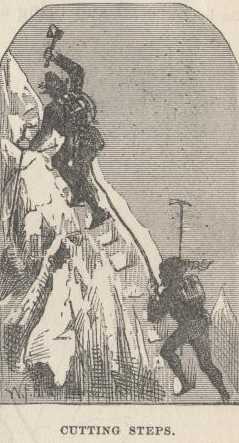
Now they arrived at the base of a great knob or dome veneered with ice and powdered with snow—the utmost, summit, the last bit of solidity between them and the hollow vault of heaven. They set to work with their hatchets, and were soon creeping, insectlike, up its surface, with their heels projecting over the thinnest kind of nothingness, thickened up a little with a few wandering shreds and films of cloud moving in a lazy procession far below. Presently, one man's toe-hold broke and he fell! There he dangled in mid-air at the end of the rope, like a spider, till his friends above hauled him into place again.
A little bit later, the party stood upon the wee pedestal of the very summit, in a driving wind, and looked out upon the vast green expanses of Italy and a shoreless ocean of billowy Alps.
When I had read thus far, Harris broke into the room in a noble excitement and said the ropes and the guides were secured, and asked if I was ready. I said I believed I wouldn't ascend the Altels this time. I said Alp-climbing was a different thing from what I had supposed it was, and so I judged we had better study its points a little more before we went definitely into it. But I told him to retain the guides and order them to follow us to Zermatt, because I meant to use them there. I said I could feel the spirit of adventure beginning to stir in me, and was sure that the fell fascination of Alp-climbing would soon be upon me. I said he could make up his mind to it that we would do a deed before we were a week older which would make the hair of the timid curl with fright.
This made Harris happy, and filled him with ambitious
anticipations. He went at once to tell the guides to
follow us to Zermatt and bring all their paraphernalia
with them.
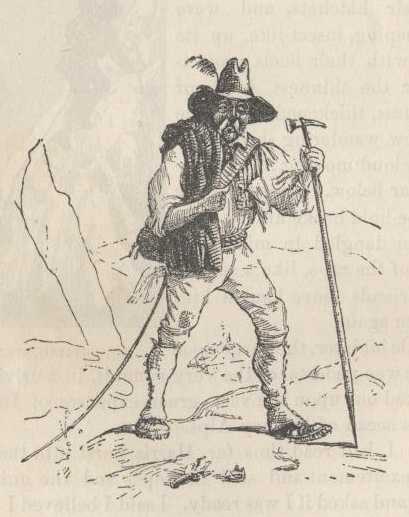
A great and priceless thing is a new interest! How it takes possession of a man! how it clings to him, how it rides him! I strode onward from the Schwarenbach hostelry a changed man, a reorganized personality. I walked into a new world, I saw with new eyes. I had been looking aloft at the giant show-peaks only as things to be worshiped for their grandeur and magnitude, and their unspeakable grace of form; I looked up at them now, as also things to be conquered and climbed. My sense of their grandeur and their noble beauty was neither lost nor impaired; I had gained a new interest in the mountains without losing the old ones. I followed the steep lines up, inch by inch, with my eye, and noted the possibility or impossibility of following them with my feet. When I saw a shining helmet of ice projecting above the clouds, I tried to imagine I saw files of black specks toiling up it roped together with a gossamer thread.
We skirted the lonely little lake called the Daubensee, and presently passed close by a glacier on the right—a thing like a great river frozen solid in its flow and broken square off like a wall at its mouth. I had never been so near a glacier before.
Here we came upon a new board shanty, and found some men
engaged in building a stone house; so the Schwarenbach was
soon to have a rival. We bought a bottle or so of beer here;
at any rate they called it beer, but I knew by the price
that it was dissolved jewelry, and I perceived by the
taste that dissolved jewelry is not good stuff to drink.
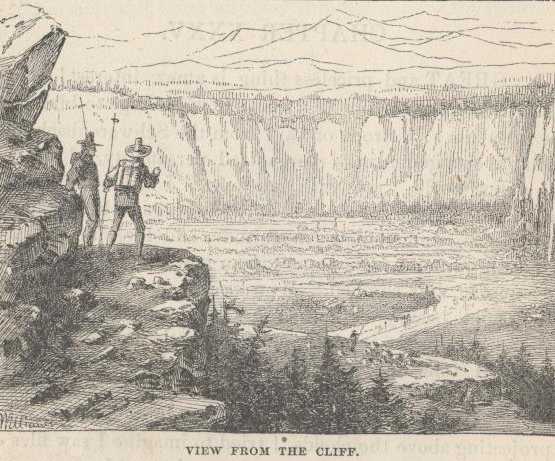
We were surrounded by a hideous desolation. We stepped forward to a sort of jumping-off place, and were confronted by a startling contrast: we seemed to look down into fairyland. Two or three thousand feet below us was a bright green level, with a pretty town in its midst, and a silvery stream winding among the meadows; the charming spot was walled in on all sides by gigantic precipices clothed with pines; and over the pines, out of the softened distances, rose the snowy domes and peaks of the Monte Rosa region. How exquisitely green and beautiful that little valley down there was! The distance was not great enough to obliterate details, it only made them little, and mellow, and dainty, like landscapes and towns seen through the wrong end of a spy-glass.
Right under us a narrow ledge rose up out of the valley,
with a green, slanting, bench-shaped top, and grouped
about upon this green-baize bench were a lot of black
and white sheep which looked merely like oversized worms.
The bench seemed lifted well up into our neighborhood,
but that was a deception—it was a long way down to it.
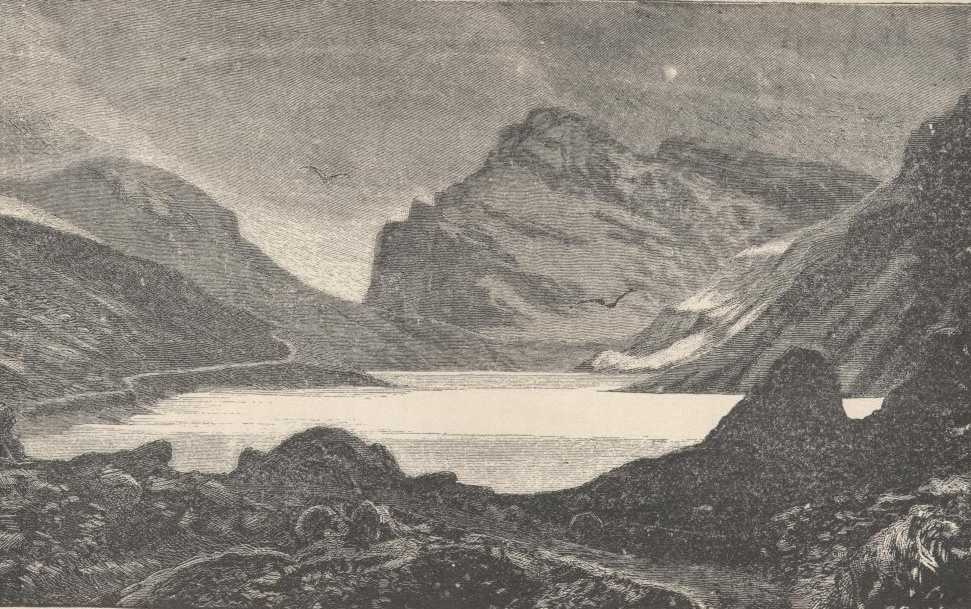
We began our descent, now, by the most remarkable road I have ever seen. It wound its corkscrew curves down the face of the colossal precipice—a narrow way, with always the solid rock wall at one elbow, and perpendicular nothingness at the other. We met an everlasting procession of guides, porters, mules, litters, and tourists climbing up this steep and muddy path, and there was no room to spare when you had to pass a tolerably fat mule. I always took the inside, when I heard or saw the mule coming, and flattened myself against the wall. I preferred the inside, of course, but I should have had to take it anyhow, because the mule prefers the outside. A mule's preference—on a precipice—is a thing to be respected. Well, his choice is always the outside. His life is mostly devoted to carrying bulky panniers and packages which rest against his body—therefore he is habituated to taking the outside edge of mountain paths, to keep his bundles from rubbing against rocks or banks on the other. When he goes into the passenger business he absurdly clings to his old habit, and keeps one leg of his passenger always dangling over the great deeps of the lower world while that passenger's heart is in the highlands, so to speak. More than once I saw a mule's hind foot cave over the outer edge and send earth and rubbish into the bottom abyss; and I noticed that upon these occasions the rider, whether male or female, looked tolerably unwell.
There was one place where an eighteen-inch breadth of
light masonry had been added to the verge of the path,
and as there was a very sharp turn here, a panel of fencing
had been set up there at some time, as a protection.
This panel was old and gray and feeble, and the light
masonry had been loosened by recent rains. A young
American girl came along on a mule, and in making the turn
the mule's hind foot caved all the loose masonry and one
of the fence-posts overboard; the mule gave a violent lurch
inboard to save himself, and succeeded in the effort,
but that girl turned as white as the snows of Mont Blanc
for a moment.
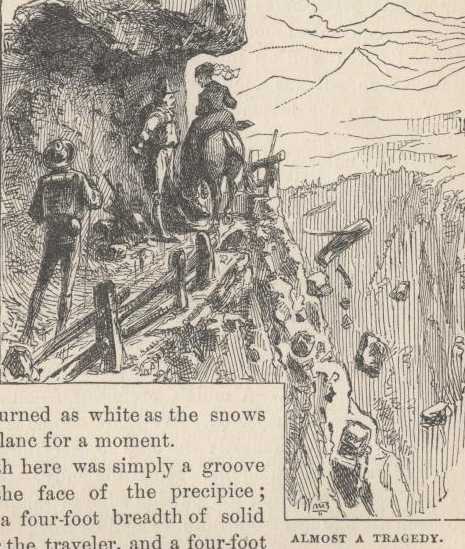
The path was simply a groove cut into the face of the precipice; there was a four-foot breadth of solid rock under the traveler, and four-foot breadth of solid rock just above his head, like the roof of a narrow porch; he could look out from this gallery and see a sheer summitless and bottomless wall of rock before him, across a gorge or crack a biscuit's toss in width—but he could not see the bottom of his own precipice unless he lay down and projected his nose over the edge. I did not do this, because I did not wish to soil my clothes.
Every few hundred yards, at particularly bad places, one came across a panel or so of plank fencing; but they were always old and weak, and they generally leaned out over the chasm and did not make any rash promises to hold up people who might need support. There was one of these panels which had only its upper board left; a pedestrianizing English youth came tearing down the path, was seized with an impulse to look over the precipice, and without an instant's thought he threw his weight upon that crazy board. It bent outward a foot! I never made a gasp before that came so near suffocating me. The English youth's face simply showed a lively surprise, but nothing more. He went swinging along valleyward again, as if he did not know he had just swindled a coroner by the closest kind of a shave.
The Alpine litter is sometimes like a cushioned box
made fast between the middles of two long poles,
and sometimes it is a chair with a back to it and a support
for the feet. It is carried by relays of strong porters.
The motion is easier than that of any other conveyance.
We met a few men and a great many ladies in litters;
it seemed to me that most of the ladies looked pale
and nauseated; their general aspect gave me the idea
that they were patiently enduring a horrible suffering.
As a rule, they looked at their laps, and left the scenery
to take care of itself.
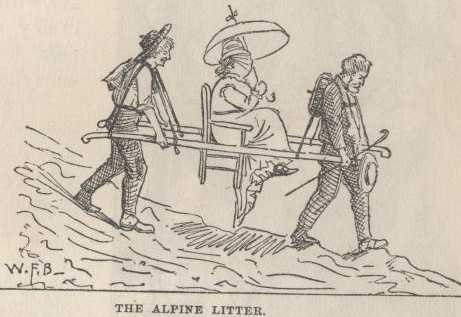
But the most frightened creature I saw, was a led horse
that overtook us. Poor fellow, he had been born and reared
in the grassy levels of the Kandersteg valley and had
never seen anything like this hideous place before.
Every few steps he would stop short, glance wildly out from
the dizzy height, and then spread his red nostrils wide
and pant as violently as if he had been running a race;
and all the while he quaked from head to heel as with
a palsy. He was a handsome fellow, and he made a fine
statuesque picture of terror, but it was pitiful to see
him suffer so.
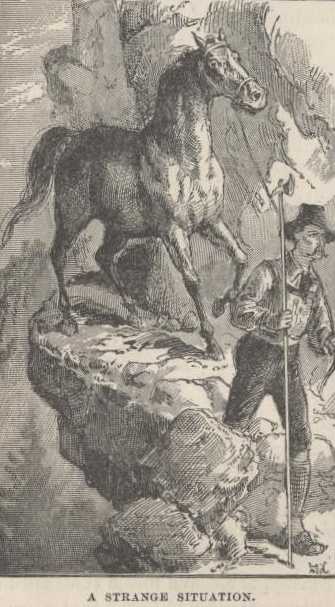
This dreadful path has had its tragedy. Baedeker, with his customary over terseness, begins and ends the tale thus:
"The descent on horseback should be avoided. In 1861 a Comtesse d'Herlincourt fell from her saddle over the precipice and was killed on the spot."
We looked over the precipice there, and saw the monument which commemorates the event. It stands in the bottom of the gorge, in a place which has been hollowed out of the rock to protect it from the torrent and the storms. Our old guide never spoke but when spoken to, and then limited himself to a syllable or two, but when we asked him about this tragedy he showed a strong interest in the matter. He said the Countess was very pretty, and very young—hardly out of her girlhood, in fact. She was newly married, and was on her bridal tour. The young husband was riding a little in advance; one guide was leading the husband's horse, another was leading the bride's.
The old man continued:
"The guide that was leading the husband's horse happened
to glance back, and there was that poor young thing sitting
up staring out over the precipice; and her face began
to bend downward a little, and she put up her two hands
slowly and met it—so,—and put them flat against her
eyes—so—and then she sank out of the saddle, with a
sharp shriek, and one caught only the flash of a dress,
and it was all over."
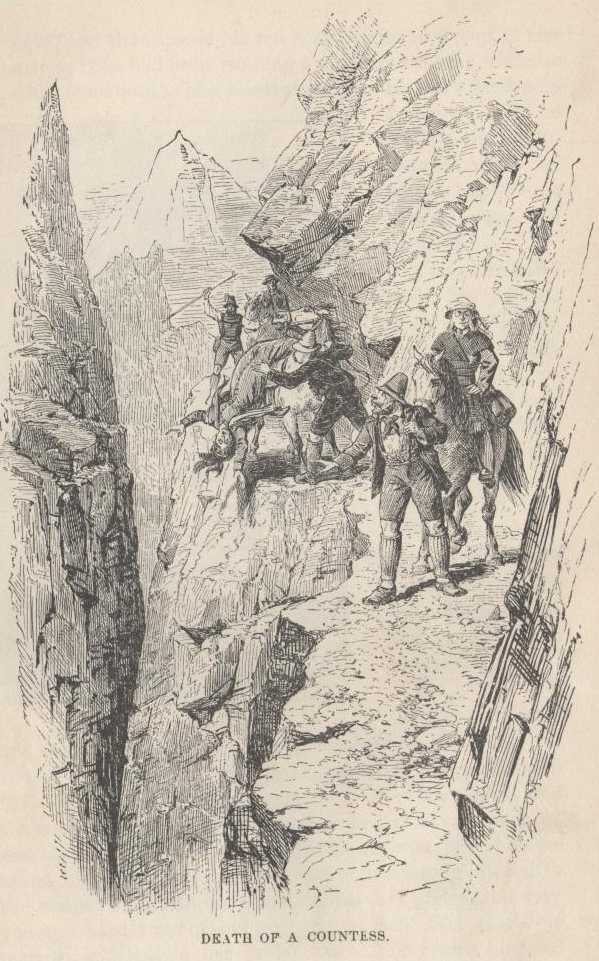
Then after a pause:
"Ah, yes, that guide saw these things—yes, he saw them all. He saw them all, just as I have told you."
After another pause:
"Ah, yes, he saw them all. My God, that was ME. I was that guide!"
This had been the one event of the old man's life; so one may be sure he had forgotten no detail connected with it. We listened to all he had to say about what was done and what happened and what was said after the sorrowful occurrence, and a painful story it was.
When we had wound down toward the valley until we were about on the last spiral of the corkscrew, Harris's hat blew over the last remaining bit of precipice—a small cliff a hundred or hundred and fifty feet high—and sailed down toward a steep slant composed of rough chips and fragments which the weather had flaked away from the precipices. We went leisurely down there, expecting to find it without any trouble, but we had made a mistake, as to that. We hunted during a couple of hours—not because the old straw hat was valuable, but out of curiosity to find out how such a thing could manage to conceal itself in open ground where there was nothing left for it to hide behind. When one is reading in bed, and lays his paper-knife down, he cannot find it again if it is smaller than a saber; that hat was as stubborn as any paper-knife could have been, and we finally had to give it up; but we found a fragment that had once belonged to an opera-glass, and by digging around and turning over the rocks we gradually collected all the lenses and the cylinders and the various odds and ends that go to making up a complete opera-glass. We afterward had the thing reconstructed, and the owner can have his adventurous lost-property by submitting proofs and paying costs of rehabilitation. We had hopes of finding the owner there, distributed around amongst the rocks, for it would have made an elegant paragraph; but we were disappointed. Still, we were far from being disheartened, for there was a considerable area which we had not thoroughly searched; we were satisfied he was there, somewhere, so we resolved to wait over a day at Leuk and come back and get him.
Then we sat down to polish off the perspiration and arrange about what we would do with him when we got him. Harris was for contributing him to the British Museum; but I was for mailing him to his widow. That is the difference between Harris and me: Harris is all for display, I am all for the simple right, even though I lose money by it. Harris argued in favor of his proposition against mine, I argued in favor of mine and against his. The discussion warmed into a dispute; the dispute warmed into a quarrel. I finally said, very decidedly:
"My mind is made up. He goes to the widow."
Harris answered sharply:
"And MY mind is made up. He goes to the Museum."
I said, calmly:
"The museum may whistle when it gets him."
Harris retorted:
"The widow may save herself the trouble of whistling, for I will see that she never gets him."
After some angry bandying of epithets, I said:
"It seems to me that you are taking on a good many airs about these remains. I don't quite see what YOU'VE got to say about them?"
"I? I've got ALL to say about them. They'd never have been thought of if I hadn't found their opera-glass. The corpse belongs to me, and I'll do as I please with him."
I was leader of the Expedition, and all discoveries achieved by it naturally belonged to me. I was entitled to these remains, and could have enforced my right; but rather than have bad blood about the matter, I said we would toss up for them. I threw heads and won, but it was a barren victory, for although we spent all the next day searching, we never found a bone. I cannot imagine what could ever have become of that fellow.
The town in the valley is called Leuk or Leukerbad. We pointed our course toward it, down a verdant slope which was adorned with fringed gentians and other flowers, and presently entered the narrow alleys of the outskirts and waded toward the middle of the town through liquid "fertilizer." They ought to either pave that village or organize a ferry.
Harris's body was simply a chamois-pasture; his person was populous with the little hungry pests; his skin, when he stripped, was splotched like a scarlet-fever patient's; so, when we were about to enter one of the Leukerbad inns, and he noticed its sign, "Chamois Hotel," he refused to stop there. He said the chamois was plentiful enough, without hunting up hotels where they made a specialty of it. I was indifferent, for the chamois is a creature that will neither bite me nor abide with me; but to calm Harris, we went to the Hôtel des Alpes.
At the table d'hôte, we had this, for an incident. A very grave man—in fact his gravity amounted to solemnity, and almost to austerity—sat opposite us and he was "tight," but doing his best to appear sober. He took up a CORKED bottle of wine, tilted it over his glass awhile, then set it out of the way, with a contented look, and went on with his dinner.
Presently he put his glass to his mouth, and of course found it empty. He looked puzzled, and glanced furtively and suspiciously out of the corner of his eye at a benignant and unconscious old lady who sat at his right. Shook his head, as much as to say, "No, she couldn't have done it." He tilted the corked bottle over his glass again, meantime searching around with his watery eye to see if anybody was watching him. He ate a few mouthfuls, raised his glass to his lips, and of course it was still empty. He bent an injured and accusing side-glance upon that unconscious old lady, which was a study to see. She went on eating and gave no sign. He took up his glass and his bottle, with a wise private nod of his head, and set them gravely on the left-hand side of his plate—poured himself another imaginary drink—went to work with his knife and fork once more—presently lifted his glass with good confidence, and found it empty, as usual.
This was almost a petrifying surprise. He straightened himself up in his chair and deliberately and sorrowfully inspected the busy old ladies at his elbows, first one and then the other. At last he softly pushed his plate away, set his glass directly in front of him, held on to it with his left hand, and proceeded to pour with his right. This time he observed that nothing came. He turned the bottle clear upside down; still nothing issued from it; a plaintive look came into his face, and he said, as if to himself,
"'IC! THEY'VE GOT IT ALL!" Then he set the bottle down,
resignedly, and took the rest of his dinner dry.
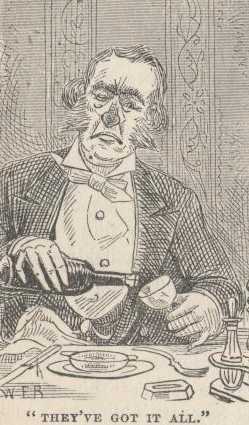
It was at that table d'hôte, too, that I had under inspection the largest lady I have ever seen in private life. She was over seven feet high, and magnificently proportioned. What had first called my attention to her, was my stepping on an outlying flange of her foot, and hearing, from up toward the ceiling, a deep "Pardon, m'sieu, but you encroach!"
That was when we were coming through the hall, and the place
was dim, and I could see her only vaguely. The thing
which called my attention to her the second time was,
that at a table beyond ours were two very pretty girls,
and this great lady came in and sat down between them
and me and blotted out my view. She had a handsome face,
and she was very finely formed—perfectly formed,
I should say. But she made everybody around her look trivial
and commonplace. Ladies near her looked like children,
and the men about her looked mean. They looked like failures;
and they looked as if they felt so, too. She sat with
her back to us. I never saw such a back in my life.
I would have so liked to see the moon rise over it.
The whole congregation waited, under one pretext or another,
till she finished her dinner and went out; they wanted to see
her at full altitude, and they found it worth tarrying for.
She filled one's idea of what an empress ought to be,
when she rose up in her unapproachable grandeur and moved
superbly out of that place.
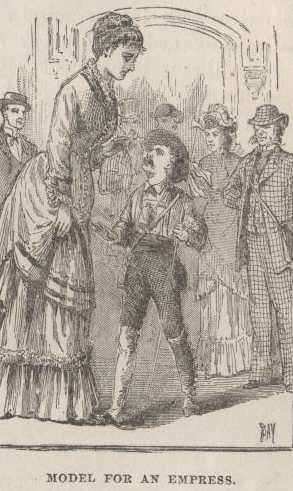
We were not at Leuk in time to see her at her heaviest weight.
She had suffered from corpulence and had come there to get
rid of her extra flesh in the baths. Five weeks of
soaking—five uninterrupted hours of it every day—had accomplished
her purpose and reduced her to the right proportions.
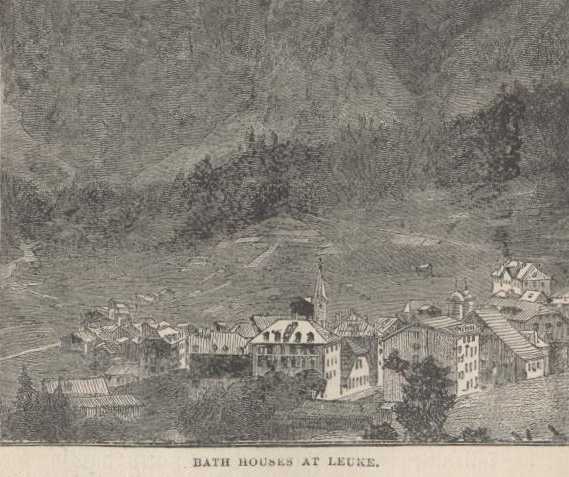
Those baths remove fat, and also skin-diseases. The
patients remain in the great tanks for hours at a time.
A dozen gentlemen and ladies occupy a tank together,
and amuse themselves with rompings and various games.
They have floating desks and tables, and they read or lunch
or play chess in water that is breast-deep. The tourist
can step in and view this novel spectacle if he chooses.
There's a poor-box, and he will have to contribute.
There are several of these big bathing-houses, and you can
always tell when you are near one of them by the romping
noises and shouts of laughter that proceed from it.
The water is running water, and changes all the time,
else a patient with a ringworm might take the bath with only
a partial success, since, while he was ridding himself of
the ringworm, he might catch the itch.
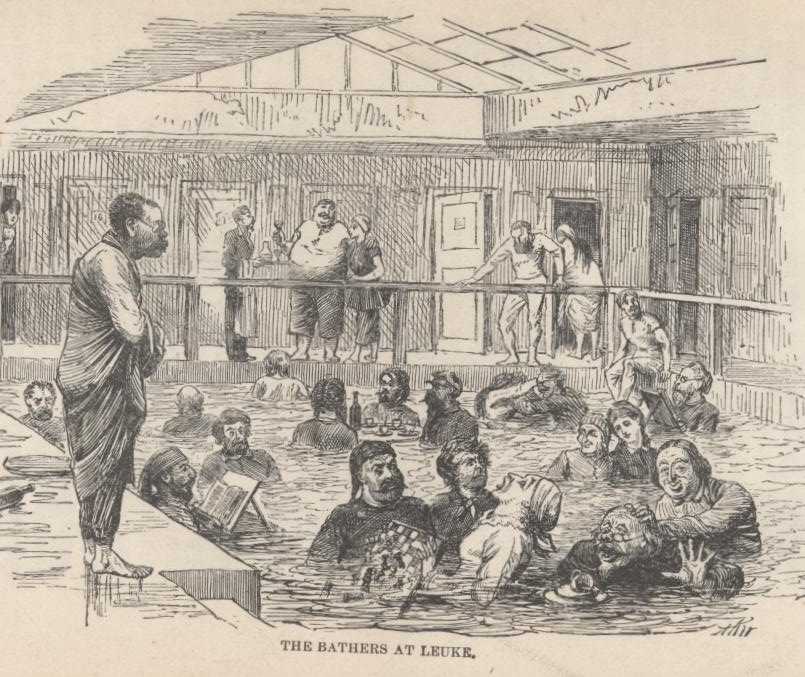
The next morning we wandered back up the green valley, leisurely, with the curving walls of those bare and stupendous precipices rising into the clouds before us. I had never seen a clean, bare precipice stretching up five thousand feet above me before, and I never shall expect to see another one. They exist, perhaps, but not in places where one can easily get close to them. This pile of stone is peculiar. From its base to the soaring tops of its mighty towers, all its lines and all its details vaguely suggest human architecture. There are rudimentary bow-windows, cornices, chimneys, demarcations of stories, etc. One could sit and stare up there and study the features and exquisite graces of this grand structure, bit by bit, and day after day, and never weary his interest. The termination, toward the town, observed in profile, is the perfection of shape. It comes down out of the clouds in a succession of rounded, colossal, terracelike projections—a stairway for the gods; at its head spring several lofty storm-scarred towers, one after another, with faint films of vapor curling always about them like spectral banners. If there were a king whose realms included the whole world, here would be the place meet and proper for such a monarch. He would only need to hollow it out and put in the electric light. He could give audience to a nation at a time under its roof.
Our search for those remains having failed, we inspected with a glass the dim and distant track of an old-time avalanche that once swept down from some pine-grown summits behind the town and swept away the houses and buried the people; then we struck down the road that leads toward the Rhone, to see the famous Ladders. These perilous things are built against the perpendicular face of a cliff two or three hundred feet high. The peasants, of both sexes, were climbing up and down them, with heavy loads on their backs. I ordered Harris to make the ascent, so I could put the thrill and horror of it in my book, and he accomplished the feat successfully, through a subagent, for three francs, which I paid. It makes me shudder yet when I think of what I felt when I was clinging there between heaven and earth in the person of that proxy. At times the world swam around me, and I could hardly keep from letting go, so dizzying was the appalling danger. Many a person would have given up and descended, but I stuck to my task, and would not yield until I had accomplished it. I felt a just pride in my exploit, but I would not have repeated it for the wealth of the world. I shall break my neck yet with some such foolhardy performance, for warnings never seem to have any lasting effect on me. When the people of the hotel found that I had been climbing those crazy Ladders, it made me an object of considerable attention.
Next morning, early, we drove to the Rhone valley and took the train for Visp. There we shouldered our knapsacks and things, and set out on foot, in a tremendous rain, up the winding gorge, toward Zermatt. Hour after hour we slopped along, by the roaring torrent, and under noble Lesser Alps which were clothed in rich velvety green all the way up and had little atomy Swiss homes perched upon grassy benches along their mist-dimmed heights.
The rain continued to pour and the torrent to boom, and we continued to enjoy both. At the one spot where this torrent tossed its white mane highest, and thundered loudest, and lashed the big boulders fiercest, the canton had done itself the honor to build the flimsiest wooden bridge that exists in the world. While we were walking over it, along with a party of horsemen, I noticed that even the larger raindrops made it shake. I called Harris's attention to it, and he noticed it, too. It seemed to me that if I owned an elephant that was a keepsake, and I thought a good deal of him, I would think twice before I would ride him over that bridge.
We climbed up to the village of St. Nicholas, about half
past four in the afternoon, waded ankle-deep through
the fertilizer-juice, and stopped at a new and nice hotel
close by the little church. We stripped and went to bed,
and sent our clothes down to be baked. And the horde
of soaked tourists did the same. That chaos of clothing
got mixed in the kitchen, and there were consequences.
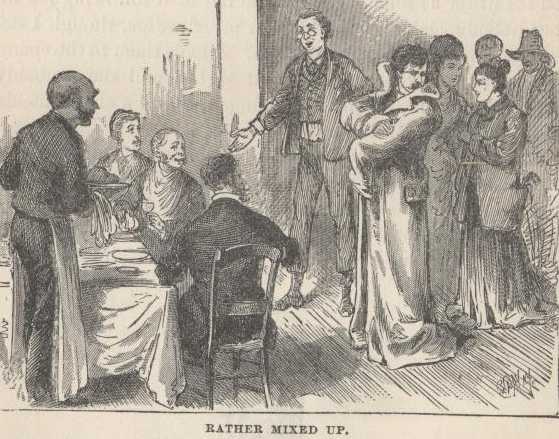
I did not get back the same drawers I sent down, when our things came up at six-fifteen; I got a pair on a new plan. They were merely a pair of white ruffle-cuffed absurdities, hitched together at the top with a narrow band, and they did not come quite down to my knees. They were pretty enough, but they made me feel like two people, and disconnected at that. The man must have been an idiot that got himself up like that, to rough it in the Swiss mountains. The shirt they brought me was shorter than the drawers, and hadn't any sleeves to it—at least it hadn't anything more than what Mr. Darwin would call "rudimentary" sleeves; these had "edging" around them, but the bosom was ridiculously plain. The knit silk undershirt they brought me was on a new plan, and was really a sensible thing; it opened behind, and had pockets in it to put your shoulder-blades in; but they did not seem to fit mine, and so I found it a sort of uncomfortable garment. They gave my bobtail coat to somebody else, and sent me an ulster suitable for a giraffe. I had to tie my collar on, because there was no button behind on that foolish little shirt which I described a while ago.
When I was dressed for dinner at six-thirty, I was too loose in some places and too tight in others, and altogether I felt slovenly and ill-conditioned. However, the people at the table d'hôte were no better off than I was; they had everybody's clothes but their own on. A long stranger recognized his ulster as soon as he saw the tail of it following me in, but nobody claimed my shirt or my drawers, though I described them as well as I was able. I gave them to the chambermaid that night when I went to bed, and she probably found the owner, for my own things were on a chair outside my door in the morning.
There was a lovable English clergyman who did
not get to the table d'hôte at all. His breeches
had turned up missing, and without any equivalent.
He said he was not more particular than other people,
but he had noticed that a clergyman at dinner without
any breeches was almost sure to excite remark.
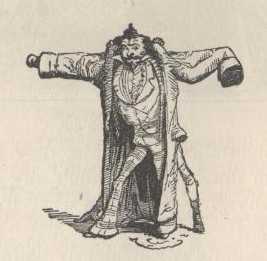
| Previous Part | Next Part |
End of Project Gutenberg's A Tramp Abroad, by Mark Twain (Samuel Clemens)
*** END OF THIS PROJECT GUTENBERG EBOOK A TRAMP ABROAD ***
***** This file should be named 5786-h.htm or 5786-h.zip *****
This and all associated files of various formats will be found in:
http://www.gutenberg.org/5/7/8/5786/
Produced by Anonymous Volunteers, John Greenman and David Widger
Updated editions will replace the previous one--the old editions
will be renamed.
Creating the works from public domain print editions means that no
one owns a United States copyright in these works, so the Foundation
(and you!) can copy and distribute it in the United States without
permission and without paying copyright royalties. Special rules,
set forth in the General Terms of Use part of this license, apply to
copying and distributing Project Gutenberg-tm electronic works to
protect the PROJECT GUTENBERG-tm concept and trademark. Project
Gutenberg is a registered trademark, and may not be used if you
charge for the eBooks, unless you receive specific permission. If you
do not charge anything for copies of this eBook, complying with the
rules is very easy. You may use this eBook for nearly any purpose
such as creation of derivative works, reports, performances and
research. They may be modified and printed and given away--you may do
practically ANYTHING with public domain eBooks. Redistribution is
subject to the trademark license, especially commercial
redistribution.
*** START: FULL LICENSE ***
THE FULL PROJECT GUTENBERG LICENSE
PLEASE READ THIS BEFORE YOU DISTRIBUTE OR USE THIS WORK
To protect the Project Gutenberg-tm mission of promoting the free
distribution of electronic works, by using or distributing this work
(or any other work associated in any way with the phrase "Project
Gutenberg"), you agree to comply with all the terms of the Full Project
Gutenberg-tm License (available with this file or online at
http://gutenberg.org/license).
Section 1. General Terms of Use and Redistributing Project Gutenberg-tm
electronic works
1.A. By reading or using any part of this Project Gutenberg-tm
electronic work, you indicate that you have read, understand, agree to
and accept all the terms of this license and intellectual property
(trademark/copyright) agreement. If you do not agree to abide by all
the terms of this agreement, you must cease using and return or destroy
all copies of Project Gutenberg-tm electronic works in your possession.
If you paid a fee for obtaining a copy of or access to a Project
Gutenberg-tm electronic work and you do not agree to be bound by the
terms of this agreement, you may obtain a refund from the person or
entity to whom you paid the fee as set forth in paragraph 1.E.8.
1.B. "Project Gutenberg" is a registered trademark. It may only be
used on or associated in any way with an electronic work by people who
agree to be bound by the terms of this agreement. There are a few
things that you can do with most Project Gutenberg-tm electronic works
even without complying with the full terms of this agreement. See
paragraph 1.C below. There are a lot of things you can do with Project
Gutenberg-tm electronic works if you follow the terms of this agreement
and help preserve free future access to Project Gutenberg-tm electronic
works. See paragraph 1.E below.
1.C. The Project Gutenberg Literary Archive Foundation ("the Foundation"
or PGLAF), owns a compilation copyright in the collection of Project
Gutenberg-tm electronic works. Nearly all the individual works in the
collection are in the public domain in the United States. If an
individual work is in the public domain in the United States and you are
located in the United States, we do not claim a right to prevent you from
copying, distributing, performing, displaying or creating derivative
works based on the work as long as all references to Project Gutenberg
are removed. Of course, we hope that you will support the Project
Gutenberg-tm mission of promoting free access to electronic works by
freely sharing Project Gutenberg-tm works in compliance with the terms of
this agreement for keeping the Project Gutenberg-tm name associated with
the work. You can easily comply with the terms of this agreement by
keeping this work in the same format with its attached full Project
Gutenberg-tm License when you share it without charge with others.
1.D. The copyright laws of the place where you are located also govern
what you can do with this work. Copyright laws in most countries are in
a constant state of change. If you are outside the United States, check
the laws of your country in addition to the terms of this agreement
before downloading, copying, displaying, performing, distributing or
creating derivative works based on this work or any other Project
Gutenberg-tm work. The Foundation makes no representations concerning
the copyright status of any work in any country outside the United
States.
1.E. Unless you have removed all references to Project Gutenberg:
1.E.1. The following sentence, with active links to, or other immediate
access to, the full Project Gutenberg-tm License must appear prominently
whenever any copy of a Project Gutenberg-tm work (any work on which the
phrase "Project Gutenberg" appears, or with which the phrase "Project
Gutenberg" is associated) is accessed, displayed, performed, viewed,
copied or distributed:
This eBook is for the use of anyone anywhere at no cost and with
almost no restrictions whatsoever. You may copy it, give it away or
re-use it under the terms of the Project Gutenberg License included
with this eBook or online at www.gutenberg.org
1.E.2. If an individual Project Gutenberg-tm electronic work is derived
from the public domain (does not contain a notice indicating that it is
posted with permission of the copyright holder), the work can be copied
and distributed to anyone in the United States without paying any fees
or charges. If you are redistributing or providing access to a work
with the phrase "Project Gutenberg" associated with or appearing on the
work, you must comply either with the requirements of paragraphs 1.E.1
through 1.E.7 or obtain permission for the use of the work and the
Project Gutenberg-tm trademark as set forth in paragraphs 1.E.8 or
1.E.9.
1.E.3. If an individual Project Gutenberg-tm electronic work is posted
with the permission of the copyright holder, your use and distribution
must comply with both paragraphs 1.E.1 through 1.E.7 and any additional
terms imposed by the copyright holder. Additional terms will be linked
to the Project Gutenberg-tm License for all works posted with the
permission of the copyright holder found at the beginning of this work.
1.E.4. Do not unlink or detach or remove the full Project Gutenberg-tm
License terms from this work, or any files containing a part of this
work or any other work associated with Project Gutenberg-tm.
1.E.5. Do not copy, display, perform, distribute or redistribute this
electronic work, or any part of this electronic work, without
prominently displaying the sentence set forth in paragraph 1.E.1 with
active links or immediate access to the full terms of the Project
Gutenberg-tm License.
1.E.6. You may convert to and distribute this work in any binary,
compressed, marked up, nonproprietary or proprietary form, including any
word processing or hypertext form. However, if you provide access to or
distribute copies of a Project Gutenberg-tm work in a format other than
"Plain Vanilla ASCII" or other format used in the official version
posted on the official Project Gutenberg-tm web site (www.gutenberg.org),
you must, at no additional cost, fee or expense to the user, provide a
copy, a means of exporting a copy, or a means of obtaining a copy upon
request, of the work in its original "Plain Vanilla ASCII" or other
form. Any alternate format must include the full Project Gutenberg-tm
License as specified in paragraph 1.E.1.
1.E.7. Do not charge a fee for access to, viewing, displaying,
performing, copying or distributing any Project Gutenberg-tm works
unless you comply with paragraph 1.E.8 or 1.E.9.
1.E.8. You may charge a reasonable fee for copies of or providing
access to or distributing Project Gutenberg-tm electronic works provided
that
- You pay a royalty fee of 20% of the gross profits you derive from
the use of Project Gutenberg-tm works calculated using the method
you already use to calculate your applicable taxes. The fee is
owed to the owner of the Project Gutenberg-tm trademark, but he
has agreed to donate royalties under this paragraph to the
Project Gutenberg Literary Archive Foundation. Royalty payments
must be paid within 60 days following each date on which you
prepare (or are legally required to prepare) your periodic tax
returns. Royalty payments should be clearly marked as such and
sent to the Project Gutenberg Literary Archive Foundation at the
address specified in Section 4, "Information about donations to
the Project Gutenberg Literary Archive Foundation."
- You provide a full refund of any money paid by a user who notifies
you in writing (or by e-mail) within 30 days of receipt that s/he
does not agree to the terms of the full Project Gutenberg-tm
License. You must require such a user to return or
destroy all copies of the works possessed in a physical medium
and discontinue all use of and all access to other copies of
Project Gutenberg-tm works.
- You provide, in accordance with paragraph 1.F.3, a full refund of any
money paid for a work or a replacement copy, if a defect in the
electronic work is discovered and reported to you within 90 days
of receipt of the work.
- You comply with all other terms of this agreement for free
distribution of Project Gutenberg-tm works.
1.E.9. If you wish to charge a fee or distribute a Project Gutenberg-tm
electronic work or group of works on different terms than are set
forth in this agreement, you must obtain permission in writing from
both the Project Gutenberg Literary Archive Foundation and Michael
Hart, the owner of the Project Gutenberg-tm trademark. Contact the
Foundation as set forth in Section 3 below.
1.F.
1.F.1. Project Gutenberg volunteers and employees expend considerable
effort to identify, do copyright research on, transcribe and proofread
public domain works in creating the Project Gutenberg-tm
collection. Despite these efforts, Project Gutenberg-tm electronic
works, and the medium on which they may be stored, may contain
"Defects," such as, but not limited to, incomplete, inaccurate or
corrupt data, transcription errors, a copyright or other intellectual
property infringement, a defective or damaged disk or other medium, a
computer virus, or computer codes that damage or cannot be read by
your equipment.
1.F.2. LIMITED WARRANTY, DISCLAIMER OF DAMAGES - Except for the "Right
of Replacement or Refund" described in paragraph 1.F.3, the Project
Gutenberg Literary Archive Foundation, the owner of the Project
Gutenberg-tm trademark, and any other party distributing a Project
Gutenberg-tm electronic work under this agreement, disclaim all
liability to you for damages, costs and expenses, including legal
fees. YOU AGREE THAT YOU HAVE NO REMEDIES FOR NEGLIGENCE, STRICT
LIABILITY, BREACH OF WARRANTY OR BREACH OF CONTRACT EXCEPT THOSE
PROVIDED IN PARAGRAPH F3. YOU AGREE THAT THE FOUNDATION, THE
TRADEMARK OWNER, AND ANY DISTRIBUTOR UNDER THIS AGREEMENT WILL NOT BE
LIABLE TO YOU FOR ACTUAL, DIRECT, INDIRECT, CONSEQUENTIAL, PUNITIVE OR
INCIDENTAL DAMAGES EVEN IF YOU GIVE NOTICE OF THE POSSIBILITY OF SUCH
DAMAGE.
1.F.3. LIMITED RIGHT OF REPLACEMENT OR REFUND - If you discover a
defect in this electronic work within 90 days of receiving it, you can
receive a refund of the money (if any) you paid for it by sending a
written explanation to the person you received the work from. If you
received the work on a physical medium, you must return the medium with
your written explanation. The person or entity that provided you with
the defective work may elect to provide a replacement copy in lieu of a
refund. If you received the work electronically, the person or entity
providing it to you may choose to give you a second opportunity to
receive the work electronically in lieu of a refund. If the second copy
is also defective, you may demand a refund in writing without further
opportunities to fix the problem.
1.F.4. Except for the limited right of replacement or refund set forth
in paragraph 1.F.3, this work is provided to you 'AS-IS' WITH NO OTHER
WARRANTIES OF ANY KIND, EXPRESS OR IMPLIED, INCLUDING BUT NOT LIMITED TO
WARRANTIES OF MERCHANTIBILITY OR FITNESS FOR ANY PURPOSE.
1.F.5. Some states do not allow disclaimers of certain implied
warranties or the exclusion or limitation of certain types of damages.
If any disclaimer or limitation set forth in this agreement violates the
law of the state applicable to this agreement, the agreement shall be
interpreted to make the maximum disclaimer or limitation permitted by
the applicable state law. The invalidity or unenforceability of any
provision of this agreement shall not void the remaining provisions.
1.F.6. INDEMNITY - You agree to indemnify and hold the Foundation, the
trademark owner, any agent or employee of the Foundation, anyone
providing copies of Project Gutenberg-tm electronic works in accordance
with this agreement, and any volunteers associated with the production,
promotion and distribution of Project Gutenberg-tm electronic works,
harmless from all liability, costs and expenses, including legal fees,
that arise directly or indirectly from any of the following which you do
or cause to occur: (a) distribution of this or any Project Gutenberg-tm
work, (b) alteration, modification, or additions or deletions to any
Project Gutenberg-tm work, and (c) any Defect you cause.
Section 2. Information about the Mission of Project Gutenberg-tm
Project Gutenberg-tm is synonymous with the free distribution of
electronic works in formats readable by the widest variety of computers
including obsolete, old, middle-aged and new computers. It exists
because of the efforts of hundreds of volunteers and donations from
people in all walks of life.
Volunteers and financial support to provide volunteers with the
assistance they need, are critical to reaching Project Gutenberg-tm's
goals and ensuring that the Project Gutenberg-tm collection will
remain freely available for generations to come. In 2001, the Project
Gutenberg Literary Archive Foundation was created to provide a secure
and permanent future for Project Gutenberg-tm and future generations.
To learn more about the Project Gutenberg Literary Archive Foundation
and how your efforts and donations can help, see Sections 3 and 4
and the Foundation web page at http://www.pglaf.org.
Section 3. Information about the Project Gutenberg Literary Archive
Foundation
The Project Gutenberg Literary Archive Foundation is a non profit
501(c)(3) educational corporation organized under the laws of the
state of Mississippi and granted tax exempt status by the Internal
Revenue Service. The Foundation's EIN or federal tax identification
number is 64-6221541. Its 501(c)(3) letter is posted at
http://pglaf.org/fundraising. Contributions to the Project Gutenberg
Literary Archive Foundation are tax deductible to the full extent
permitted by U.S. federal laws and your state's laws.
The Foundation's principal office is located at 4557 Melan Dr. S.
Fairbanks, AK, 99712., but its volunteers and employees are scattered
throughout numerous locations. Its business office is located at
809 North 1500 West, Salt Lake City, UT 84116, (801) 596-1887, email
business@pglaf.org. Email contact links and up to date contact
information can be found at the Foundation's web site and official
page at http://pglaf.org
For additional contact information:
Dr. Gregory B. Newby
Chief Executive and Director
gbnewby@pglaf.org
Section 4. Information about Donations to the Project Gutenberg
Literary Archive Foundation
Project Gutenberg-tm depends upon and cannot survive without wide
spread public support and donations to carry out its mission of
increasing the number of public domain and licensed works that can be
freely distributed in machine readable form accessible by the widest
array of equipment including outdated equipment. Many small donations
($1 to $5,000) are particularly important to maintaining tax exempt
status with the IRS.
The Foundation is committed to complying with the laws regulating
charities and charitable donations in all 50 states of the United
States. Compliance requirements are not uniform and it takes a
considerable effort, much paperwork and many fees to meet and keep up
with these requirements. We do not solicit donations in locations
where we have not received written confirmation of compliance. To
SEND DONATIONS or determine the status of compliance for any
particular state visit http://pglaf.org
While we cannot and do not solicit contributions from states where we
have not met the solicitation requirements, we know of no prohibition
against accepting unsolicited donations from donors in such states who
approach us with offers to donate.
International donations are gratefully accepted, but we cannot make
any statements concerning tax treatment of donations received from
outside the United States. U.S. laws alone swamp our small staff.
Please check the Project Gutenberg Web pages for current donation
methods and addresses. Donations are accepted in a number of other
ways including checks, online payments and credit card donations.
To donate, please visit: http://pglaf.org/donate
Section 5. General Information About Project Gutenberg-tm electronic
works.
Professor Michael S. Hart is the originator of the Project Gutenberg-tm
concept of a library of electronic works that could be freely shared
with anyone. For thirty years, he produced and distributed Project
Gutenberg-tm eBooks with only a loose network of volunteer support.
Project Gutenberg-tm eBooks are often created from several printed
editions, all of which are confirmed as Public Domain in the U.S.
unless a copyright notice is included. Thus, we do not necessarily
keep eBooks in compliance with any particular paper edition.
Most people start at our Web site which has the main PG search facility:
http://www.gutenberg.org
This Web site includes information about Project Gutenberg-tm,
including how to make donations to the Project Gutenberg Literary
Archive Foundation, how to help produce our new eBooks, and how to
subscribe to our email newsletter to hear about new eBooks.